December
2010 Download Roundup
Brian
Wilson
I’ve included in this Roundup several recordings
suitable for the Christmas period, concentrating on less obvious
repertoire.
Download of the
Month - New Repertoire
 Pyotr
Ilyich TCHAIKOVSKY (1840-1893)
Pyotr
Ilyich TCHAIKOVSKY (1840-1893)
The Nutcracker: Ballet, Op.71 [86:21]
Berlin Philharmonic Orchestra/Simon Rattle
EMI CLASSICS 6463852 [43:48 + 42:38] - from Amazon.co.uk
or hmvdigital.com
(mp3)
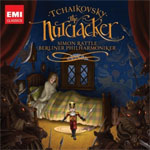 No
sooner had I recommended the Bonynge version as on balance the
best version available for download when the new Simon Rattle
version came upon the scene to take its place not only as my
download of choice but as my absolute benchmark, replacing the
OSR/Ansermet, now on Australian Eloquence. The new version comes
without coupling but, at £7.49 from Amazon.co.uk (256
kb/s) or £7.99 from HMV Digital (320 kb/s) - and not much
more on CD - it’s very competitively priced. Don’t get confused
with the shorter, single-CD slightly abridged version at £6.99
on offer from Amazon, unless that’s all that you want. You may
find that you have to re-number the tracks in your player: Squeezebox
plays CD2 first unless you do so. Be very careful not to delete
a track in the process - backup the originals first, or buy
the CDs.
No
sooner had I recommended the Bonynge version as on balance the
best version available for download when the new Simon Rattle
version came upon the scene to take its place not only as my
download of choice but as my absolute benchmark, replacing the
OSR/Ansermet, now on Australian Eloquence. The new version comes
without coupling but, at £7.49 from Amazon.co.uk (256
kb/s) or £7.99 from HMV Digital (320 kb/s) - and not much
more on CD - it’s very competitively priced. Don’t get confused
with the shorter, single-CD slightly abridged version at £6.99
on offer from Amazon, unless that’s all that you want. You may
find that you have to re-number the tracks in your player: Squeezebox
plays CD2 first unless you do so. Be very careful not to delete
a track in the process - backup the originals first, or buy
the CDs.
If you’re looking for more Christmas magic from Tchaikovsky,
try the delightful new Covent Garden DVD of Cherevichki,
The Tsarina’s Slippers (Opus Arte OA1037D): as strongly
recommended as the new Nutcracker.
Download of the
Month - Back Catalogue: The Art of the Prima Donna
Thomas ARNE Artaxerxes
Act 3 - The soldier tir'd of war’s alarms [4:07]
Georg Frideric HANDEL Samson
HWV 57 Act 3 - Let the bright seraphim [5:57]
Vincenzo BELLINI Norma
Act 1 - Sediziose voci...Casta Diva...Ah! bello a me ritorna
[12:47]
I Puritani Act 1 - Son vergin vezzosa [3:06]
Gioacchino ROSSINI Semiramide
Act 1 - Bel raggio lusinghier [6:41]
Vincenzo BELLINI I Puritani
Act 2 - O rendetemi la speme...Qui la voce...Vien, diletto
[7:02]
La Sonnambula Act 1 - Care compagne, e voi, tenere
amici [8:25]
Charles GOUNOD Faust
Act 3 - O Dieu! que de bijoux...Ah! je ris de me voir [4:41]
Roméo et Juliette Act 1 - Ah, je veux vivre
[3:32]
Giuseppe VERDI Otello
Act 4 - Mia madre aveva una povera ancella...piangea cantando
[8:05]
Wolfgang Amadeus MOZART
Die Entführung aus dem Serail, K.384 Act 2 - Martern
aller Arten [8:43]
Giuseppe VERDI La Traviata
Act 1 - E strano! - Ah, fors’è lui - Sempre libera
[6:45]
Ambroise THOMAS Hamlet
Act 4 - A vos jeux, mes amis, permettez-moi [8:51]
Léo DELIBES Lakmé
Act 2 - Où va la jeune Indoue (Bell song) [7:52]
Giacomo MEYERBEER Les
Huguenots Act 2 - O beau pays de la Touraine [5:45]
Giuseppe VERDI Rigoletto
Act 1 - Scena ed Aria. Gualtier Maldè - Caro nome
Dame Joan Sutherland (soprano); Chorus and Orchestra of the
Royal Opera House, Covent Garden/Francesco Molinari-Pradelli
- rec. 1960. ADD.
DECCA 467 1152 [52:46 + 55:52] - from Passionato.com
(mp3)
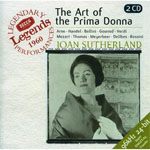 De
mortuis nil nisi bonum. I’ve said some rude things in my
time about the late Joan Sutherland’s diction - indeed, the
words of most of the items on this 2-CD set are pretty hard
to fathom - but that wonderful voice more than compensates.
These recordings were made early in her career, soon after La
Stupenda had taken the operatic world by storm and they
still have the power to take the listener by the throat, especially
as the Decca recording still sounds so well, even in mp3. Whatever
other operatic idols you may have, this is essential listening.
If you must have the words - as I say, they are pretty inaudible
- you will need the CDs, though most of the items are so very
well known that you may know them already. Decca single out
the Jewel Song from Faust as the choicest item, and it
is stupendous, but so is everything else.
De
mortuis nil nisi bonum. I’ve said some rude things in my
time about the late Joan Sutherland’s diction - indeed, the
words of most of the items on this 2-CD set are pretty hard
to fathom - but that wonderful voice more than compensates.
These recordings were made early in her career, soon after La
Stupenda had taken the operatic world by storm and they
still have the power to take the listener by the throat, especially
as the Decca recording still sounds so well, even in mp3. Whatever
other operatic idols you may have, this is essential listening.
If you must have the words - as I say, they are pretty inaudible
- you will need the CDs, though most of the items are so very
well known that you may know them already. Decca single out
the Jewel Song from Faust as the choicest item, and it
is stupendous, but so is everything else.
Bargain of the
Month
Sergei RACHMANINOV (1873-1943)
Rhapsody on a Theme of Paganini, Op.43 [21:48]
Ernst von (Ernö) DOHNÁNYI
(1877-1960) Variations on a Nursery Theme, Op.25
[24:10]
Julius Katchen; LPO/Adrian Boult - rec. 1954. Mono/ADD
PAST CLASSICS[45:58] – from eMusic
(mp3) or NAXOS CLASSICAL ARCHIVE 9.80648 [46:19] – from
classicsonline.com (mp3)
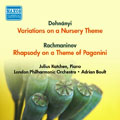 These
classic 1954 Decca performances come on just two tracks from
eMusic - potentially as little as 48p, and no more than 84p
in total when the new pricing structure is introduced - or £1.99
from classisconline.com. Not available in the USA and some other
countries - and it may not be available in the UK and the rest
of the EU for much longer for copyright reasons. Lively and
attractive performances of instantly likeable music, and the
mono sound is still good. eMusic place the Rachmaninov first,
classicsonline the Dohnányi.
These
classic 1954 Decca performances come on just two tracks from
eMusic - potentially as little as 48p, and no more than 84p
in total when the new pricing structure is introduced - or £1.99
from classisconline.com. Not available in the USA and some other
countries - and it may not be available in the UK and the rest
of the EU for much longer for copyright reasons. Lively and
attractive performances of instantly likeable music, and the
mono sound is still good. eMusic place the Rachmaninov first,
classicsonline the Dohnányi.
Christmas Bargain
Download: A Christmas Present from Polyphony
 John
RUTTER Silent night [3:31]
John
RUTTER Silent night [3:31]
Herbert HOWELLS Sing Lullaby
[3:10]
William WALTON All this
time [1:38]
Edvard GRIEG Ave, maris
stella [3:36]
Peter CORNELIUS Die Könige
[2:50]
Arvo PÄRT O Morgenstern
[2:23] Magnificat [6:56]
John RUTTER Nativity Carol
[4:50]
Percy GRAINGER, Dana PERNA
The Sussex Mummer’s Carol [1:46]
Benjamin BRITTEN A Hymn
to the Virgin [3:12]
Kenneth LEIGHTON Lully,
lulla, thou little tiny child [3:13]
John RUTTER Away in a manger
[2:23]
Morten LAURIDSEN O magnum
mysterium [6:31]
Peter WARLOCK Bethlehem
Down [4:26]
Herbert HOWELLS A Spotless
Rose [3:21]
Benjamin BRITTEN Chorale
after an Old French Carol [4:36]
William WALTON What cheer?
[1:06]
Peter WARLOCK, Andrew CARTER Lullaby
my Jesus [2:55]
John RUTTER Shepherd’s Pipe
Carol [2:52]
Polyphony; City of London Sinfonia/Stephen Layton
NOEL2
[66:47] - from Hyperion
(mp3 and lossless)
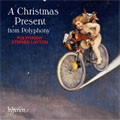
At just £2.99 for such a varied programme, this is virtually
self-recommending, especially as most of the CDs from which
the programme is drawn are not entirely seasonal in content
- the exception is John Rutter: Music for Christmas (CDA67245),
which is well worth acquiring in addition, duplicating just
four of the items here.
A Festival of Christmas
 Ding
Dong Merrily on High [1:56]
Ding
Dong Merrily on High [1:56]
The Infant King [3:39]
Where Was Jesus Born [3:35]
The Carol Singers [2:48]
I Saw a Maiden [3:25]
Dance Little Goatling [3:21]
As Joseph was A-Walking [1:34]
Cradle Song [4:05]
The Boar’s Head [1:24]
Buenos Reyes (A Spanish Carol) [3:31]
O Little Sweet One [3:21]
Three Little Birdies [1:51]
Little Robin Redbreast [2:26]
Hop-Hop-Hop [1:29]
Little One Sleep [3:51]
Deck the Hall with Boughs of Holly [2:39]
In the Bleak Midwinter [2:55]
Silent Night [3:12]
O Come All Ye Faithful [3:34]
Jocelyn Bell (girl soprano); St Ambrose RC Junior School Choir,
Speke; Royal Liverpool Philharmonic Choir and Orchestra/Edmund
Walters - rec. July, 1981. DDD.
CHANDOS CHAN8436 [54:36] - from theclassicalshop.net
(mp3 and lossless)
These are traditional, large-scale performances of many of the
usual suspects and several less familiar ones. At £3.60
(mp3) or £3.74 (lossless) this is almost as fine a bargain
as the Hyperion selection above and there is no overlap, so
you could have both for less than most single CDs or downloads.
The same programme is available more expensively on CHAN6672.
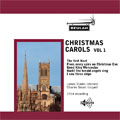
Beulah Extra have two charming and inexpensive novelties
from 1954 which you may wish to add to your download list: Christmas
Carols (1BX59) [11:42] and Christmas Carols 2 (2BX59)
[13:14], on which seasonal music is performed on the organ and
chime bells by Charles Smart and James Blades. (50p or US$0.81
each: click here
for link.)
Sacred Music in the Renaissance: Volume
2
Antoine BRUMEL (c1460-c1520)
Missa Et ecce terræ motus [47:09]
Heinrich ISAAC (c1450-1517)
Missa de Apostolis [29:00]
Jacob OBRECHT (1457/8-1505)
Missa Maria zart [69:18]
Heinrich ISAAC (c1450-1517)
Tota pulchra es [9:05]
Alfonso FERRABOSCO the Elder
(1542/3-1588) Lamentations I [10:00]
Thomas TALLIS (c1505-1585)
Lamentations I [8:48] ; Lamentations II [13:15]
Antoine BRUMEL (c1460-c1520)
Lamentations [9:06]
Robert WHITE (c1538-1574)
Lamentations (5vv) [21:56]
Giovanni Pierluigi da PALESTRINA
(1525/6-1594) Lamentations for Holy Saturday [9:46]
Cipriano de RORE (c1515/16-1565)
Descendi in hortum meum [5:36]; Missa Præter
rerum seriem [30:02]
Manuel CARDOSO (c1566-1650)
Requiem [47:20]
The Tallis Scholars/Peter Phillips - rec. 1990-1999. DDD.
Texts and translations included as pdf booklet.
GIMELL GIMBX302 [4 CDs: 5 hours 10 minutes] - from Gimell
(mp3 and lossless)
Sacred Music in the Renaissance: Volume 3
Philippe VERDELOT (c1480/85-
? 1530/32) Si bona suscepimus [7:09]
Nicolas GOMBERT (c1495-c1560)
Magnificat 1, Primi toni [11:41]
Magnificat 2, Secundi toni [11:19]
Magnificat 3, Tertii et octavi toni [12:34]
Magnificat 4, Quarti toni [12:21]
Magnificat 5, Quinti toni [11:13]
Magnificat 6, Sexti et primi toni [13:11]
Magnificat 7, Septimi toni [11:13]
Magnificat 8, Octavi toni [12:56]
John BROWNE (fl.c.1490)
Salve regina I [13:15]
Stabat iuxta [12:24]
Stabat mater [15:56]
O regina mundi clara [13:55]
O Maria salvatoris [15:54]
Giovanni Pierluigi da PALESTRINA
(1525/6-1594)
Stabat mater [9:52]
Missa Papæ Marcelli [31:52]
Tu es Petrus (6vv) [6:51]
Gregorio ALLEGRI (1582-1652)
Miserere (with additional embellishments by Deborah
Roberts) [13:44]
JOSQUIN des Prez (c1450/55-1521)
Missa Malheur me bat [39:45]
Missa Fortuna desperata [35:45]
The Tallis Scholars/Peter Phillips - rec. 2000-2009. DDD
Texts and translations included as pdf booklet.
GIMELL GIMBX303 [4 CDs: 5 hours 13 minutes] - from Gimell
(mp3, lossless and 24-bit)
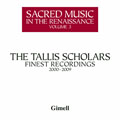 The
second and third volumes of Gimell’s 30th Anniversary celebratory
boxes are just as self-recommending as Volume One which I made
Reissue of the Month in last month’s Download Roundup
- perhaps even more so, since the recordings in both volumes
are DDD and Volume 3 is also available in better-than-CD 24-bit
technology. My only criticism is that they now make redundant
some of the earlier budget-price two-CD reissues which I and
others have already recommended here on Musicweb, excellent
value though they are.
The
second and third volumes of Gimell’s 30th Anniversary celebratory
boxes are just as self-recommending as Volume One which I made
Reissue of the Month in last month’s Download Roundup
- perhaps even more so, since the recordings in both volumes
are DDD and Volume 3 is also available in better-than-CD 24-bit
technology. My only criticism is that they now make redundant
some of the earlier budget-price two-CD reissues which I and
others have already recommended here on Musicweb, excellent
value though they are.
For the contents of all these four-disc boxes and, indeed, for
all the recordings available from Gimell, please see my recent
article The Tallis Scholars at 30 - here.
You will see from that article how the wheel has come full circle
with new versions from the last decade of the Palestrina Missa
Papæ Marcelli and Allegri’s Miserere which
made their reputation all those years ago - that first version
of the Miserere opens Volume 1 of these three new boxes.
With twelve discs released now, this 30th-anniversary offering
becomes even more comparable in scope with Hyperion’s 10-CD
30th-anniversary set of recordings by The Sixteen (The Golden
Age CDS44401/10) and, miraculously, if you purchase both,
as I recommend that you do, on CD or as downloads, there is
very little overlap. Both offer essential and substantial booklets
of notes, texts and translations to downloaders. See John Quinn’s
detailed analysis of Volume 2 here.
Both, too, offer superb value. Volume 3 of the Scholars’ collection
is worth buying for the two Josquin Masses alone - when they
appeared in 2009, they cost as much as the entire contents of
GIMBX303, and just look what a wealth of other goodies now appear
along with them, including the major contents of two other full-price
CDs of Gombert’s eight settings of the Magnificat (CDGIM037
and 038).
Vivat Leo! Music for a Medici Pope
Andreas de SILVA: Gaude
felix Florentia [11:02]
Adrian WILLAERT: Virgo
gloriosa Christi, Margareta [3:12]; Saluto te, sancta
Virgo Maria [6:15]
Johannes de la FAGE: Videns
dominus civitatem desolatam [4:20]
Jean MOUTON: Nesciens
mater virgo virum [3:22]; Per lignum salvi [2:23];
Exalta regina Gallie [3:02]
Josquin DESPREZ: Nymphes
des bois [4:33] ; Miserere mei, Deus [14:19]
Andreas de SILVA: Omnis
pulchritudo Domini [4:35]
Costanzo FESTA: Inviolata,
integra et casta es [7:52]
Cappella Pratensis/Joshua Rifkin - rec. 1009. DDD.
CHANNEL CLASSICS CC72366 [64:55] - from eMusic
(mp3)
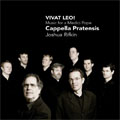 This
recording appeared for download several days before it was released
on CD on 15 November 2010. The music, drawn from the Medici
Codex, is a mixture of sacred and secular collected for the
court of the Medici court of Pope Leo X, whose rule (1513-21)
coincided with Luther’s publication of the 95 Theses.
This
recording appeared for download several days before it was released
on CD on 15 November 2010. The music, drawn from the Medici
Codex, is a mixture of sacred and secular collected for the
court of the Medici court of Pope Leo X, whose rule (1513-21)
coincided with Luther’s publication of the 95 Theses.
Cappella Pratensis are building a fine reputation: Gary Higginson
made their recording of Obrecht’s Missa de Sancto Donatiano
(Fineline FL72414), Recording of the Month earlier this
year - see review
- and they acquit themselves well here under the direction of
Joshua Rifkin.
Johann Sebastian BACH (1685-1750)
Concerto in a minor for flute, violin and harpsichord, BWV10441
Harpsichord Concerto in A, BWV10552
Sonata in C, BWV10373
Richard Adeney (flute)1; Granville Jones (violin)1;
Philomusica of London1-3/Thurston Dart (harpsichord)1-3
- rec. 1958. ADD/stereo
BEULAH EXTRA 4BX691 [20:39]; BEULAH EXTRA 5BX692 [13:22]
BEULAH EXTRA 6BX693 [7:54] - from Beulah
(mp3)
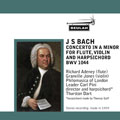 This
is second-league Bach, but still well above the standard of
most of his contemporaries. These recordings, pioneering in
their day in the use of small forces and the application of
scholarship by Thurston Dart, a far from stuffy London University
academic in his day job, have come up as fresh as paint in these
beautifully clean transfers. Though BWV1037 is now known to
be spurious and is played here without the final gigue, it’s
still worth having Dart’s performance. If you combine them in
one folder on your hard drive, you may find that BWV1055 follows
too hard on the heels of its predecessor. Beulah give the date
1959, which I take to be when L'Oiseau Lyre issued them in stereo:
they had appeared in mono the previous year.
This
is second-league Bach, but still well above the standard of
most of his contemporaries. These recordings, pioneering in
their day in the use of small forces and the application of
scholarship by Thurston Dart, a far from stuffy London University
academic in his day job, have come up as fresh as paint in these
beautifully clean transfers. Though BWV1037 is now known to
be spurious and is played here without the final gigue, it’s
still worth having Dart’s performance. If you combine them in
one folder on your hard drive, you may find that BWV1055 follows
too hard on the heels of its predecessor. Beulah give the date
1959, which I take to be when L'Oiseau Lyre issued them in stereo:
they had appeared in mono the previous year.
Other Bach recordings on Beulah Extra:
Details of all these Beulah Extra Bach recordings may be found
here.
Fantasia and Fugue in g minor, BWV542 [5:34]
Louis Vierne (organ of Notre Dame, Paris) - rec. 1932 ADD/mono
BEULAH EXTRA 1BX60 [5:34]
A great fellow-composer in a tradition stretching back to Bach
and beyond playing JSB’s music has to be something special,
but the recording sounds wavery and gruff, though miraculously
free from surface noise. As with all the 78s in the Beulah Extra
series, the sound has not been doctored other than to remove
seriously disturbing bangs and crackles. This is just about
at the limit of tolerance that I find myself able to extend
to 78 recordings, though the sense of occasion shines through.
Fantasia and Fugue in c minor, BWV537 [8:14]
Edouard Commette (organ of Cathedral of Saint Jean, Lyon) -
rec.1929 ADD/mono
BEULAH EXTRA 2BX60 [8:14]
Most surprisingly, this recording sounds much better than the
Vierne, though it dates from three years earlier - quite a bright
sound, though with plenty of bass, too, and again free from
surface noise.
Fantasia and Fugue in g minor, BWV542 [12:21]
Prelude and Fugue in C, BWV545 [6:57]
Toccata and Fugue in d minor, BWV565 [8:50]
Albert Schweitzer (organ of All Hallows Church, Barking by the
Tower, London) - rec.1935 ADD/mono
BEULAH EXTRA 3BX60-5BX60 [28:09]
These recordings are famous or infamous depending on your point
of view. Schweitzer was best known for his medical missionary
work, which left him little time to practise his technique on
the organ. Flawed or not, these performances are well worth
hearing - which of his critics could have held a candle to his
achievements? - and Beulah have tidied up the recording as well
as could be expected.
Toccata and Fugue in d minor, BWV565 [7:56]
George Thalben-Ball (Compton organ, BBC Concert Hall, Broadcasting
House, London) - rec.1933 ADD/mono)
BEULAH EXTRA 6BX60 [7:56]
How George Thalben-Ball allowed himself to be persuaded to be
recorded on a Compton electronic organ is beyond me. He does
make the most of a bad job, but this is by a long way the least
interesting of the very worthwhile Beulah series of Bach organ
works.
Variations on Sei gegrüsset, Jesu gütig, BWV768
[20:16]
Fugue in G, BWV577 [3:10]
Toccata and Fugue in F, BWV540 [14:42]
Ralph Downes (organ of the Royal Festival Hall) - rec.1958 ADD/stereo
BEULAH EXTRA 1BX67-3BX67 [38:08]
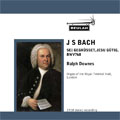 Despite
the surprisingly clear recordings afforded to Commette and Schweitzer,
we move to a different sound-world with the 1958 recordings
from the RFH. The Pye recordings of Ralph Downes, reissued in
stereo on the Golden Guinea label (which never actually cost
exactly a guinea) were central recommendations in the LP era.
The three Bach works here were originally issued in the company
of the Toccata from Widor’s Symphony No.5. Downes
himself had designed the RFH organ, so was generally reckoned
to be its best advocate. There were those (and still are) who
hated it, but it proved itself in its begetter’s hands to be
an excellent instrument for Bach, so I am very pleased to make
again the acquaintance of these three recordings - especially
now that they are shorn of the surface noise that often afflicted
Golden Guinea stereo LPs.
Despite
the surprisingly clear recordings afforded to Commette and Schweitzer,
we move to a different sound-world with the 1958 recordings
from the RFH. The Pye recordings of Ralph Downes, reissued in
stereo on the Golden Guinea label (which never actually cost
exactly a guinea) were central recommendations in the LP era.
The three Bach works here were originally issued in the company
of the Toccata from Widor’s Symphony No.5. Downes
himself had designed the RFH organ, so was generally reckoned
to be its best advocate. There were those (and still are) who
hated it, but it proved itself in its begetter’s hands to be
an excellent instrument for Bach, so I am very pleased to make
again the acquaintance of these three recordings - especially
now that they are shorn of the surface noise that often afflicted
Golden Guinea stereo LPs.
For comparison I tried the mp3 set of Bach Organ Works which
Nimbus have fitted on 8 CDs - see review.
Downes’ performances compare favourably with Bowyer’s on that
set, which I now regard as my benchmark as well as a superb
bargain, and the 1958 recording can still hold its own against
the Nimbus: both are encoded at 320kbps. If anything, I slightly
prefer Downes’ dancing performance of the Fugue in G
even to Bowyer’s.
Clavierübung: Partita No.3 in a minor, BWV827; Partita
No.4 in d minor, BWV828
Ralph Kirkpatrick (harpsichord) - rec.1958 ADD/stereo
1BX89 [19:01] and 2BX89 [33:28]
Like Ralph Downes on the RFH organ, these recordings are recent
enough to be heard in decent sound. Kirkpatrick’s Bach may no
longer be at the cutting edge, as it was when DGG issued the
partitas as part of a 3-LP set in 1959, but it is well worth
hearing. Nos. 5 and 6 were commended at the time as the best
of the set - may we have those next, please?
Cantata No.53: Schlage doch gewünschte Stunde [9:02]
BEULAH 1BX61 [9:02]
Cantata No. 54: Widerstehe doch der Sünde [17:12]
BEULAH 2BX61 [17:12]
Cantata No.200: Bekennen will ich seinen Namen [4:01]
Helen Watts (alto); Philomusica of London/Thurston Dart (harpsichord)
- rec. 1958 ADD/stereo
BEULAH 3BX61 [4:01]
The solo parts are beautifully sung throughout, as one would
expect, but the very slow opening tempo in Cantata 54 put
me off from the start - for one thing, Helen Watts sounds a
little plummy at this speed. This is not Thurston Dart as I
remember him in Bach or Handel and no match for his recording
of the Water Music, which Beulah have also reissued (below),
or the Bach Concertos (above). Alec Robertson, the Gramophone
reviewer, characterised Cantatas 53, 54 and 200 on the original
Oiseau-Lyre LP as lesser-known, which is, perhaps, why he thought
the performances so good. Nowadays none of them could really
be called little-known but, as Beulah point out, Cantata
53 is now regarded as spurious. Though I enjoyed the excerpts
from the other cantatas more than No.54, there are much better
versions to be had.
Though the Beulah sound is good, you'd be better off in No.54
with James Bowman and the King’s Consort on Hyperion’s budget
label, Helios (CDH55312, with Cantatas 169 and 170 - CD, mp3
or lossless download). You will see from my review
that this is the slowest of the modern recordings of the cantata,
yet it takes just 12:26 against 17:12 from Watts and Dart.
 Complete
Cantatas (Vol.9), Cantatas for Advent: Cantatas Nos. 61 Nun
komm, der Heiden Heiland [13:31]; 36 Schwingt freudig
euch empor [27:28]; 62 Nun komm, der Heiden Heiland
[16:00] and 132 Bereitet die Wege, bereitet die Bahn
[16:12]
Complete
Cantatas (Vol.9), Cantatas for Advent: Cantatas Nos. 61 Nun
komm, der Heiden Heiland [13:31]; 36 Schwingt freudig
euch empor [27:28]; 62 Nun komm, der Heiden Heiland
[16:00] and 132 Bereitet die Wege, bereitet die Bahn
[16:12]
Gerlinde Sämann (soprano), Petra Noskaiová (mezzo),
Christoph Genz (tenor), Jan Van der Crabben (bass); La Petite
Band/Sigiswald Kuijken - rec. December 2008. DDD.
ACCENT ACC25309 [73:11] - from Passionato.com
(mp3 and lossless) or Classicsonline.com
(mp3)
 Cantatas
Nos.37 Wer da gläubet (Ascension, 1724) [16:23];
38 Aus tiefer Not (Trinity 21, 1724) [18:44]; 39 Brich
dem Hungrigen dein Brot (Trinity 1, 1726) [24:54] and 40
Darzu ist erschienen der Sohn Gottes (2nd Day of Christmas,
1723) [15:16]
Cantatas
Nos.37 Wer da gläubet (Ascension, 1724) [16:23];
38 Aus tiefer Not (Trinity 21, 1724) [18:44]; 39 Brich
dem Hungrigen dein Brot (Trinity 1, 1726) [24:54] and 40
Darzu ist erschienen der Sohn Gottes (2nd Day of Christmas,
1723) [15:16]
Concentus Musicus Wien/Nikolaus Harnoncourt; Leonhardt Consort/Gustav
Leonhardt. ADD.
from TELDEC DAS ALTE WERK 4509 917572 [75:19] - from
Amazon.co.uk
(mp3)
 Cantatas
Nos.109 Ich glaube, lieber Herr (Trinity 21, 1723) [25:12];
110 Unser Mund sei voll Lachens (Christmas, 1725) [26:33]
and 111 Was mein Gott will (Epiphany 3, 1725) [19:58]
Cantatas
Nos.109 Ich glaube, lieber Herr (Trinity 21, 1723) [25:12];
110 Unser Mund sei voll Lachens (Christmas, 1725) [26:33]
and 111 Was mein Gott will (Epiphany 3, 1725) [19:58]
Gächinger Kantorei; Stuttgart Bach Collegium/Helmuth Rilling
- rec.1975-81. ADD.
HÄNSSLER CD92.035 [71:43] - from Passionato.com
(mp3)
The Bach Cantata Pilgrimage: Volume 16 - Cantatas for the
Sunday after Christmas
 Motet:
Singet dem Herrn ein neues Lied, BWV 225 (1727) [12:59]
Motet:
Singet dem Herrn ein neues Lied, BWV 225 (1727) [12:59]
Tritt auf die Glaubensbahn, BWV 152 (1714) [18:01]
Das neugeborne Kindelein, BWV 122 (1724) [14:56]
Gottlob! Nun geht das Jahr zu Ende, BWV 28 (1725) [14:05]
Singet dem Herrn ein neues Lied! BWV190 (for New Year’s
Day,1724) [16:53]
Katharine Fuge, Gillian Keith, Joanne Lunn (sopranos); Daniel
Taylor (alto); James Gilchrist (tenor); Peter Harvey (bass);
The Monteverdi Choir;
English Baroque Soloists/Sir John Eliot Gardiner. - rec. St.
Bartholomew’s, New York, 31 December 2000. DDD.
SOLI DEO GLORIA SDG137 [77:29] - from Passionato.com
or Classicsonline.com
(both mp3)
 Cantatas
(Volume 33): Nos.41 Jesu, nun sei gepreiset (New
Year, 1727) [27:32]; 92 Ich hab in Gottes Herz und Sinn
(Septuagesima, 1725) [29:59] and 130 Herr Gott, dich loben
alle wir (St Michael, 1724) [15:04]
Cantatas
(Volume 33): Nos.41 Jesu, nun sei gepreiset (New
Year, 1727) [27:32]; 92 Ich hab in Gottes Herz und Sinn
(Septuagesima, 1725) [29:59] and 130 Herr Gott, dich loben
alle wir (St Michael, 1724) [15:04]
Yukari Nonoshita (soprano), Robin Blaze (counter-tenor), Jan
Kobow (tenor), Dominik Wörner (bass); Bach Collegium, Japan/Masaaki
Suzuki - rec. April 2005. DDD.
BIS BIS-SACD1541 [72:35] - from Passionato.com
(mp3 or lossless) or Classicsonline.com
(mp3)
Cantatas (Volume 10) Nos.105 Herr, gehe nicht ins
Gericht (Trinity 9, 1723) [21:19], 179 Siehe zu, dass
deine Gottesfurcht (Trinity 11, 1723) [14:38] and 186 Ärgre
dich, o Seele, nicht (Trinity 7, 1723) [25:50]
Robin Blaze (counter-tenor); Makoto Sakurada (tenor); Peter
Kooij (bass); Bach Collegium, Japan/Masaaki Suzuki - rec. 1999.
DDD.
BIS BIS-CD951 [61:47] - from Passionato.com
(mp3 and lossless) or Classicsonline.com
(mp3)
Bach is just as appropriate as Handel at Christmas - more so,
since Messiah was originally intended for Easter, though
it has come to be indelibly associated with Christmas. I’ve
included a selection of Advent and Christmas/New Year-period
Cantatas from the major completed or ongoing cycles.
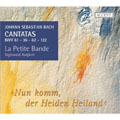 ACC25309:
The ninth volume of Sigiswald Kuijken’s ongoing one-voice-to-a-part
series of Bach Cantatas for Accent contains four Cantatas for
the First and Fourth Sundays in Advent. Lovers of 'big band'
Bach should look to the likes of Richter; the rest of us can
confidently enjoy both approaches. No texts, but these are easily
found online.
ACC25309:
The ninth volume of Sigiswald Kuijken’s ongoing one-voice-to-a-part
series of Bach Cantatas for Accent contains four Cantatas for
the First and Fourth Sundays in Advent. Lovers of 'big band'
Bach should look to the likes of Richter; the rest of us can
confidently enjoy both approaches. No texts, but these are easily
found online.
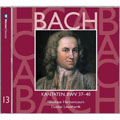 Teldec:
individual CDs from this series are no longer separately available
- Cantatas 37-60 come as part of a 6-CD set 4509 917572, around
£50 - so the availability of separate discs as downloads
from Amazon is especially welcome, particularly as they are
offered at £2.79 each. The disadvantage of being tied
to Schmieder’s arbitrary BWV numbering is that Cantatas for
different times of the liturgical year are yoked together. The
same is true of Rilling’s Hänssler recordings, though both
these ADD sets are well worth having.
Teldec:
individual CDs from this series are no longer separately available
- Cantatas 37-60 come as part of a 6-CD set 4509 917572, around
£50 - so the availability of separate discs as downloads
from Amazon is especially welcome, particularly as they are
offered at £2.79 each. The disadvantage of being tied
to Schmieder’s arbitrary BWV numbering is that Cantatas for
different times of the liturgical year are yoked together. The
same is true of Rilling’s Hänssler recordings, though both
these ADD sets are well worth having.
 SDG137:
Both versions of the download come in good mp3 sound: the Passionato
is less expensive (£5.99) but the classicsonline version
offers notes on the works and performance from John Eliot Gardiner’s
diary of the year-long pilgrimage of which this was the fifty-ninth
and final concert. The notes are also available to subscribers
to the Naxos Music Library. As so often is the case, I find
that John Quinn has said just about all that I wanted to say
about the music and performances - see review.
SDG137:
Both versions of the download come in good mp3 sound: the Passionato
is less expensive (£5.99) but the classicsonline version
offers notes on the works and performance from John Eliot Gardiner’s
diary of the year-long pilgrimage of which this was the fifty-ninth
and final concert. The notes are also available to subscribers
to the Naxos Music Library. As so often is the case, I find
that John Quinn has said just about all that I wanted to say
about the music and performances - see review.
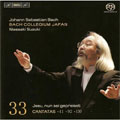 BIS-SACD1541
contains three of the most desirable recordings from Masaaki
Suzuki and the Bach Collegium Japan: for full details, see Terry
Barfoot’s review
of the SACD. You may also be interested
BIS-SACD1541
contains three of the most desirable recordings from Masaaki
Suzuki and the Bach Collegium Japan: for full details, see Terry
Barfoot’s review
of the SACD. You may also be interested 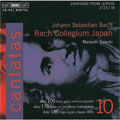 in
Peter Bright’s recent review
of Volume 46, which he considers to be perhaps the most impressive
yet. I’ve also slipped in an earlier BIS recording (BIS-CD951)
of Suzuki’s performances of three Cantatas for Sundays after
Trinity: they may be for that indeterminate time when the liturgical
colour is a neutral green, but there’s nothing indeterminate
or neutral about the music or the performances.
in
Peter Bright’s recent review
of Volume 46, which he considers to be perhaps the most impressive
yet. I’ve also slipped in an earlier BIS recording (BIS-CD951)
of Suzuki’s performances of three Cantatas for Sundays after
Trinity: they may be for that indeterminate time when the liturgical
colour is a neutral green, but there’s nothing indeterminate
or neutral about the music or the performances.
George Frideric HANDEL (1685-1759)
Details of all the Beulah Extra Handel recordings may be found
here.
Water Music Suites 1 in F [26:30], 2 in G [7:27] and 3 in D
[9:44]
Philomusica of London/Thurston Dart - rec. 1959 ADD/stereo
BEULAH EXTRA 1BX69-3BX69 [43:42] - from Beulah
(mp3)
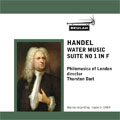 This
dates from much the same period as the Bach Concerto recordings
(above). It sounds equally stylish, blending scholarship with
a genuine feeling for the music on a par with Charles Mackerras’s
very different Pye recording of about the same vintage (now
on Testament SBT1253). To divide the music into three suites
in different keys was cutting-edge at the time, though it is
now no longer thought de rigueur to do so. The sound
is much less demanding than on more recent recordings, with
natural horns.
This
dates from much the same period as the Bach Concerto recordings
(above). It sounds equally stylish, blending scholarship with
a genuine feeling for the music on a par with Charles Mackerras’s
very different Pye recording of about the same vintage (now
on Testament SBT1253). To divide the music into three suites
in different keys was cutting-edge at the time, though it is
now no longer thought de rigueur to do so. The sound
is much less demanding than on more recent recordings, with
natural horns.
Utrecht Te Deum [26:31]; Utrecht Jubilate [18:48];
Zadok the Priest [5:59]
Ilse Wolf (soprano); Helen Watts (contralto); Wilfred Brown,
Edgar Fleet (tenor); Thomas Hemsley (bass); Geraint Jones Singers
and Orchestra/Geraint Jones - rec Walthamstow Town Hall, London,
June-July, 1958 ADD/stereo
BEULAH EXTRA 1BX66-3BX66 [51:19]
A former colleague whose judgement I trust on matters connected
with choral and vocal singing once advised me to shun the Utrecht
Te Deum and Jubilate as probably Handel’s worst
music. I don’t think they are that bad, but they are somewhat
workaday compositions - any competent musician could probably
reconstruct the entire score of each if large sections were
missing - and they need very special advocacy. Looking at the
list of soloists and bearing mind Geraint Jones’s reputation
with Handel, I expected to find that advocacy here.
In the event, this is something of a mixed blessing. Even in
1958, when authenticity was less emphasised than now, the employment
of a contralto to sing a part originally written for a counter-tenor
seemed an unusual decision, especially when the recording was
first issued on a DGG Archiv LP, supposedly the hallmark of
period practice. Perhaps I was expecting too much, but all of
the soloists let the side down at one time or another. If this
had been a live recording I wouldn’t have minded, but there
were surely opportunities for retakes.
The sound is more than acceptable for its age, though Decca
were achieving much better stereo placement and a smoother sound
in their recordings at this period - long before DGG and Decca
both fell under the Universal umbrella. The initial impression
is that someone has skimmed off the highest frequencies and
boosted the bass - not Beulah; I’m sure the fault stems from
the master tapes - but the ear soon adjusts. After the glories
of Thurston Dart’s Water Music, this was a little disappointing.
Wolfgang Amadeus MOZART (1756-1791)
Divertimento in E flat, K. 563 [47:00]; String Trio in G, K.
Anh. 66 (K. 562e) [3:56]
Henning Kraggerud (violin); Lars Anders Tomter (viola); Christoph
Richter (cello)
NAXOS 8.572258 [50:56] - from Classicsonline.com
(mp3)
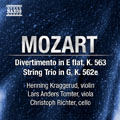 'Divertimento'
it says on the package, and the music is a delight, but not
many divertimenti run to 47 minutes or contain as much profundity.
Performance and close-ish recording do the music proud. This
recording is currently available on CD only in Norway and internationally
via the Naxos Music Library for streaming or Classicsonline
as a download, but that in no way reflects its quality: it deserves
to be widely disseminated. From both sources you'll find some
worthwhile notes by Ingrid Anderson headed 'about this recording/album.'
'Divertimento'
it says on the package, and the music is a delight, but not
many divertimenti run to 47 minutes or contain as much profundity.
Performance and close-ish recording do the music proud. This
recording is currently available on CD only in Norway and internationally
via the Naxos Music Library for streaming or Classicsonline
as a download, but that in no way reflects its quality: it deserves
to be widely disseminated. From both sources you'll find some
worthwhile notes by Ingrid Anderson headed 'about this recording/album.'
Rodolphe KREUTZER (1766-1831)
Violin Concertos Nos. 17-19
Violin Concerto No.17 in G [16:57]
Violin Concerto No.18 in e minor [28:50]
Violin Concerto No.19 in d minor [25:55]
Axel Strauss (violin); San Francisco Conservatory Orchestra/Andrew
Mogrelia
rec. Caroline H. Hume Concert Hall, San Francisco, California,
January-February 2009. DDD. NAXOS 8.570380
[71:52] - from Classicsonline.com
(mp3)
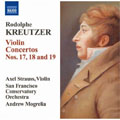 This
is the first of a planned series of all Kreutzer’s Violin Concertos,
beginning with the acknowledged masterpieces. These are attractive
and tuneful works - just don’t compare them with Mozart or Beethoven
- and the performances and recording make the listening experience
thoroughly enjoyable. Axel Strauss has already made successful
recordings of the solo Caprices of Pierre Rode and Mendelssohn’s
Lieder ohne Worte for Naxos and Andrew Mogrelia seems
to make a speciality of conducting ballets and violin concertos
for the label. They work here with the very capable orchestra
of the San Francisco Conservatory, where Strauss has taught
since 2001.
This
is the first of a planned series of all Kreutzer’s Violin Concertos,
beginning with the acknowledged masterpieces. These are attractive
and tuneful works - just don’t compare them with Mozart or Beethoven
- and the performances and recording make the listening experience
thoroughly enjoyable. Axel Strauss has already made successful
recordings of the solo Caprices of Pierre Rode and Mendelssohn’s
Lieder ohne Worte for Naxos and Andrew Mogrelia seems
to make a speciality of conducting ballets and violin concertos
for the label. They work here with the very capable orchestra
of the San Francisco Conservatory, where Strauss has taught
since 2001.
Ludwig van BEETHOVEN (1770-1827)
Details of all the Beulah Extra Beethoven recordings may be
found here.
Piano Concerto No.1 in C, Op.15 [33:12]
Géza Anda; Philharmonia Orchestra/Alceo Galliera - rec.
1955 (mono)
BEULAH EXTRA 1BX88-3BX88 [33:12]
Anda’s Beethoven was somewhat overshadowed by the series of
recordings which Solomon made with Menges and Cluytens at about
the same time, also with the Philharmonia, and now reissued
by Testament (SBT1219-1221) and by Wilhelm Kempff’s first, mono
recordings with van Kempen on DGG. The Mozart recordings which
he later made with the Salzburg Mozarteum Camerata Academica
made much more of an impact but he also established his Beethoven
credentials with the version of the Triple Concerto in
which he participated, still one of my favourite accounts of
this under-rated work.
The Anda/Galliera view of the First Piano Concerto is
gentle, essentially Mozartian, with the most delicate opening
that I have ever heard. The description of Anda’s playing as’elegant'
is something of a cliché, but it is very apt. As with
Kleiber’s Pastoral (below), I’d also want something more
forthright for when I’m in the mood - these two recordings are
essentially late-night Beethoven. The Columbia mono recording
has come up very well.
Piano Concertos Nos. 4 in G, Op.58 and 5 in E-flat, Op.73 ('Emperor')
Arthur Schoonderwoerd (fortepiano and director)/Cristofori Ensemble
ALPHA 079 [69:45] - from eMusic
(mp3)
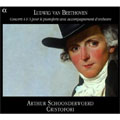
These two concertos lend themselves surprisingly well to the
same scaled-down treatment that works so well for the first
two concertos - perhaps this is even more successful. With some
justification, this recording is claimed as a world premiere:
to the best of my knowledge it’s the only one to employ one
instrument per part and a basso continuo in the 'Emperor'.
Symphony No.1 in C, Op.21 [26:09]
Vienna Philharmonic Orchestra/Carl Schuricht - rec.1952. ADD/mono
BEULAH EXTRA 1BX78-4BX78 [26:09]
I hadn’t heard Schuricht’s Beethoven - at least, not that I
can remember - so I was interested to see what he made of this
early work and how well the 1952 recording had worn. I was pleased
with what I heard right from the start in both respects. The
1952 Gramophone reviewer, MM, used such terms as’caressing'
and 'virtually impeccable' and I can only agree with him. One
thing which he mentioned is a thing of the past - keeping the
needle in the groove - and the sound now appears to be much
improved on what he heard then. Apart from the lack of stereo
placement, this sounds almost as well as Jochum’s 1958 Second
Symphony (below).
Symphony No.2 in D, Op.36 [35:39]
Berlin Philharmonic Orchestra/Eugen Jochum - rec. 1958. ADD/stereo
BEULAH EXTRA 1BX81-4BX81 [35:39]
Jochum’s Beethoven enjoyed a distinguished after-life on various
DGG reissue labels, in competition with his later Philips recordings.
The latter, made with the Concertgebouw, were available on the
budget Eloquence label until recently and still survive as a
6-CD set (Decca Original Masters 475 8147, for around £31),
so I’m pleased that Beulah have rescued this earlier BPO recording
of the Second Symphony. Jochum was at his best, I think,
in the less well-known symphonies, the second, fourth, seventh
and eighth - they tend to be my favourites, too - so this was
a particularly apt choice, especially as the recording still
sounds well in Beulah’s transfer. Now how about rescuing some
of Jochum’s Haydn, especially his DGG versions of Symphonies
88 and 98? His is the only version that I know that makes
full use of Haydn’s little joke with the harpsichord in 98.
Symphony No.6 in F, Op.68 ('Pastoral') [38:17]
London Philharmonic Orchestra/Erich Kleiber - rec. 1947. ADD/mono
BEULAH EXTRA 1BX6-3BX6 [38:17]
For most younger listeners, Beethoven+Kleiber means the wonderful
recordings of the symphonies which Carlos Kleiber made
with the VPO for DGG in the 1970s - especially Nos. 5 and 7,
now reissued on DG Originals. His father Erich was also no mean
conductor - his recording of Le Nozze di Figaro still
holds a worthy place in the catalogue - and his Pastoral
Symphony can also hold up its head among more recent competition.
It’s a very gentle view of the work - some may find the storm
a little too tame - with Kleiber and his players unwilling to
tear themselves away too quickly from the idyllic brook. Ideally,
you should also have a faster-paced, stronger version in your
collection.
The recording must have been state of the art for its day and
it still sounds well - undemonstrative to match the performance,
and with very little surface noise. Don’t expect a sonic miracle
- by 1952 the LP transfer of this recording was already being
criticised as sub-standard - but there is much to enjoy here.
Symphony No.9 in d minor, Op.125 ('Choral')
Gré Brouwenstijn (soprano); Kerstin Meyer (alto); Nicolai
Gedda (tenor); Frederick Guthrie (bass); St Hedwig’s Cathedral
Choir; Berlin Philharmonic Orchestra/André Cluytens -
rec.1958. ADD/stereo
1BX82-4BX82 [72:43]
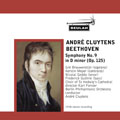 We
no longer need to worry about side-breaks which fall at awkward
points, as was the case with the original LP issue: it used
to be enough of an achievement to fit the Choral Symphony
on one disc. The performance is good throughout: if I’m being
hyper-critical, the first movement is a little slow and portentous
and the scampering scherzo a shade on the fast side, but Beethoven
often is pompous, so these are hardly major faults. The singing
in the finale is very good and the Beulah transfer a big improvement
on the original LP, with its grooves so dangerously close-packed
in the loudest music at the end of side 2.
We
no longer need to worry about side-breaks which fall at awkward
points, as was the case with the original LP issue: it used
to be enough of an achievement to fit the Choral Symphony
on one disc. The performance is good throughout: if I’m being
hyper-critical, the first movement is a little slow and portentous
and the scampering scherzo a shade on the fast side, but Beethoven
often is pompous, so these are hardly major faults. The singing
in the finale is very good and the Beulah transfer a big improvement
on the original LP, with its grooves so dangerously close-packed
in the loudest music at the end of side 2.
Overtures: Coriolan, Op.62 [6:07]; Fidelio,
Op.72 [6:29]; Leonora No.1, Op.138 [8:21]; Leonora
No.2, Op.72a [13:05]; Leonora No.3, Op.72b [12:10]
Boston Symphony Orchestra/Charles Munch - rec. 1956. ADD/Stereo.
BEULAH EXTRA 1BX32 [6:07]; 2BX32 [6:29]; 3BX32
[8:21]; 4BX32 [13:05]; 5BX32 [12:10]
I’m grateful to Beulah and High Density Tape Transfers for making
some of Munch’s recordings available again. These brisk performances
of Beethoven Overtures are a good example of Munch at his best,
though it’s mainly for the French repertoire that he is remembered
now. The recording is good for its date - genuine stereo.
The overture to The Creatures of Prometheus accompanied
these recordings when they were reissued on RCA Victrola; though
Beulah have recently given us a fine version of that work from
van Beinum - may we have that, too?
Ferdinand RIES (1784-1838) Piano
Concertos, Volume 3
Piano Concerto No. 7 in A, Op.132, 'Farewell to London' (1823)
[34:59]
Grand Variations on 'Rule Britannia', Op.116 (1817) [15:58]
Introduction et Variations Brillantes, Op.170 (1832)
[14:35]
Christopher Hinterhuber (piano); Royal Liverpool Philharmonic
Orchestra/Uwe Grodd
rec. 9-10 January 2007, Philharmonic Hall, Liverpool, UK. DDD.
NAXOS 8.570440 [66:02] - from Classicsonline.com
(mp3)
Piano Concertos, Volume 4
Concerto Pastoral in D, Op.120 (after 1813, pub.1823) [27:50]
Piano Concerto in c minor, Op.115 (1809) [25:36]
Introduction et Rondeau Brillant, WoO54 (1835) [18:00]
Christopher Hinterhuber (piano); Bournemouth Symphony Orchestra/Uwe
Grodd
rec. Concert Hall, Lighthouse, Poole, UK, June, 2008. DDD.
NAXOS 8.572088 [71:26] - from Classicsonline.com
(mp3)
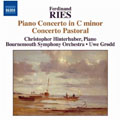 Ries
was a pupil, then life-long friend and colleague of Beethoven;
his music, though it shares some of his friend’s grandeur, is
completely of its own. These recordings are worthy successors
to the earlier volumes - see review
of Volume 1 (Bargain of the Month, 8.557638), review
of Volume 2 (8.557844) and review of Volume 3 here.
Christopher Hinterhuber and Uwe Grodd are the constants in the
series, ably abetted by four different orchestras.
Ries
was a pupil, then life-long friend and colleague of Beethoven;
his music, though it shares some of his friend’s grandeur, is
completely of its own. These recordings are worthy successors
to the earlier volumes - see review
of Volume 1 (Bargain of the Month, 8.557638), review
of Volume 2 (8.557844) and review of Volume 3 here.
Christopher Hinterhuber and Uwe Grodd are the constants in the
series, ably abetted by four different orchestras.
For all the changes of orchestra, volumes 3 and 4 maintain the
high quality of the series. The purchases come complete with
a booklet of notes, also available to those who stream from
the Naxos Music Library - try the recordings there first if
you can.
Franz SCHUBERT (1797-1828) The
Unauthorised Piano Duos
Quintet in A for piano and strings D. 667 ('Trout') arranged
for piano duet by Joseph CZERNÝ (1785-1831) [33:36]
Study for two pianos on Schubert’s Impromptu in E flat, D. 899,
no. 2 by Ede POLDINI (1869-1957) [4:29]
Overture to the drama Rosamunde, D. 644 arranged for
piano duet by Josef HÜTTENBRENNER (1796 - 1882)
[10:44]
Polonaise in B flat major (from the D. 618a sketches) realized
by Anthony GOLDSTONE (b. 1944) [4:23]
Waltzes arranged for two pianos by Sergei PROKOFIEV (1891
- 1953) [10:08]
Adagio from String Quintet in C major, D. 956 arranged for piano
duet by Hugo ULRICH (1827 - 1872) [13:44]
Anthony Goldstone (piano); Caroline Clemmow (piano)
rec. St. John the Baptist Church, Alkborough, N. Lincs. 2003?
DDD.
DIVINE ART DDA25026 [77:36] - from theclassicalshop.net
(mp3 and lossless)
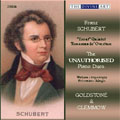
Not everything here works - the Adagio from the String Quintet,
for example: with enough genuine Schubert music for two pianists
to fill several CDs, none of it should work - but most of it
does, especially the Trout Quintet. As Chase Morrison
wrote, this is a fascinating disc - see review.
All that is lacking in this download is the booklet of notes
which CM found so helpful. Now I must investigate Volume 2.
Frédéric
(Fryderyk) CHOPIN (1810-1849)
Seventeen Songs, Op. 74 [41:47]
Czary (Enchantment) [1:45]
Dumka [1:35]
Seize-ans (Sixteen) [3:28] (from Mazurka No. 31 in A
flat, Op. 50, No. 2)*
Aime-moi (Love me) [2:37] (from Mazurka No. 23 in D,
Op. 33, No. 2)*
L'oiselet (The Little Bird) [3:20] (from Mazurka No.
47 in a minor, Op. 68, No. 2)*
Coquette [2:31] (from Mazurka No. 5 in B flat, Op. 7,
No. 1)*
* arr. Pauline VIARDOT-GARCÍA
Olga Pasichnyk (soprano)/Natalya Pasichnyk (piano) - rec. December
2009. DDD.
Pdf booklet included.
Texts and translations available online: www.naxos.com/libretti/572499.htm.
NAXOS 8.572499 [57:04] - from Classicsonline.com
(mp3)
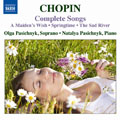 This
is unusual and very welcome fare from Naxos for the Chopin bi-centenary
in the form of his complete songs, plus four arrangements of
his Mazurkas, made by French singer Pauline Viardot-García
in 1864. These are enjoyably airy performances of mainly light-hearted
music, though there is also power and beauty here, all well
recorded.
This
is unusual and very welcome fare from Naxos for the Chopin bi-centenary
in the form of his complete songs, plus four arrangements of
his Mazurkas, made by French singer Pauline Viardot-García
in 1864. These are enjoyably airy performances of mainly light-hearted
music, though there is also power and beauty here, all well
recorded.
Don’t forget that Hyperion also has a similar inexpensive and
highly recommendable collection of the Op.74 Songs, together
with Dumka, Czary and five Viardot-García arrangements
(Helios CDH55270,
Ursula Kryger and Charles Spencer, budget price). The performances
are mostly taken at a slightly slower tempo than on the new
Naxos recording, but there is otherwise little to choose. The
Hyperion comes in lossless sound for the same low price as the
mp3 (£5.99), complete with booklet, which classicsonline
offer, though texts and translations, which are available only
online with the Naxos.
Hyperion also have a performance of the songs with Eva Podleś
in their attractive complete 16-CD set with Garick Ohlsson,
available to download at the attractive price of £60.
Unfortunately, though the songs are available individually at
£0.20 or £0.30, there is no option to purchase them
as a set, except as part of the complete edition.
Franz LISZT (1811-1886)
Hungarian Rhapsody No.4 (orch. version of piano original No.12)
Danish State Radio Symphony Orchestra/Erik Tuxen - rec.1953.
ADD/mono
BEULAH EXTRA 1BX99 [10:55] - from Beulah
(mp3)
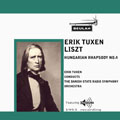
The original 10-inch LP almost persuaded one reviewer at the
time of first issue that he liked two of his least favourite
works, this and another nationalist piece, Tchaikovsky’s Marche
Slave. My taste must be poor, because I like both pieces,
especially when the music is so well performed. May we have
the Tchaikovsky, too, please?
Johannes BRAHMS (1833-1897)
Details of all the Beulah Extra Brahms recordings may be found
here.
Violin Concerto in D, Op.77
Endre Wolf; Sinfonia of London/Anthony Collins - rec.1958. ADD/stereo
1BX26-3BX26 [40:54]
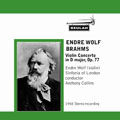 I
must be very fussy about performances of Brahms: I like only
a handful of recordings of his Fourth Symphony (below)
and most performances of the opening movement of the Violin
Concerto are too slow - often much too slow, so that we
effectively have two slow movements. Only Heifetz and Reiner
and Szeryng and Reiner (both RCA, the latter no longer available)
get it really correct. Wolf and Collins weigh in at 22:48 for
that movement, just too slow for anyone raised on Heifetz, but
about average for anyone else. (Julia Fischer in her much-lauded
recent recording for PentaTone takes 23:16).
I
must be very fussy about performances of Brahms: I like only
a handful of recordings of his Fourth Symphony (below)
and most performances of the opening movement of the Violin
Concerto are too slow - often much too slow, so that we
effectively have two slow movements. Only Heifetz and Reiner
and Szeryng and Reiner (both RCA, the latter no longer available)
get it really correct. Wolf and Collins weigh in at 22:48 for
that movement, just too slow for anyone raised on Heifetz, but
about average for anyone else. (Julia Fischer in her much-lauded
recent recording for PentaTone takes 23:16).
The playing and recording are good enough to make this a central
recommendation for most listeners. Just listen to Heifetz, though,
who takes 18:40 for the opening movement and shaves 7 minutes
off Wolf’s timing overall, and he'll change the way that you
view this concerto (RCA 74321 634702, 2 budget-price CDs - deleted,
but some dealers still have copies, or download the Violin
Concerto, with Piatigorsky in the Double Concerto,
from Amazon.co.uk.,
or on its own from Naxos
Classical Archive 9.80081 - not available in the USA).
Apart from a very muted thump in the slow movement, affecting
just a few adjacent grooves, the Beulah transfer is excellent.
Symphony No.1 in c minor, Op.68
Vienna Philharmonic Orchestra/Josef Krips - rec. 1957 ADD/stereo/binaural
1BX65-4BX65 [42:33]
Brahms’ First Symphony came comparatively late in his
career. He tried his best to escape from the shadow of Beethoven,
but still contrived to compose a big tune in the finale that
got it dubbed Beethoven’s Tenth. His angry response that any
donkey could see that doesn’t alter the fact, and performances
which wallow in the big tune emphasise it still more.
I must admit to a quickening of the pulse when Brahms leads
up to that tune, so I generally prefer a performance that makes
it sound a little more special than Krips does here. I do appreciate,
though, that the approach on this recording makes Brahms sound
more his own man, less Beethoven’s successor, and the VPO playing
is an added inducement. The Eclipse reissue was still competitive
in 1972 and, with a good transfer of the stereo recording -
Beulah describe it as binaural - this is still well worth hearing.
Symphony No.4 in e minor, Op.98
London Symphony Orchestra/Josef Krips - rec.1950. ADD/mono.
BEULAH EXTRA 5BX65-8BX85 [40:01] - from Beulah (mp3)
National Symphony Orchestra/Karl Rankl - rec 1944 ADD/mono
BEULAH EXTRA 1BX22-4BX22 [35:09]
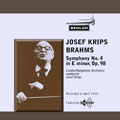 Brahms’
music looks and sounds as if it ought to be easy to bring off,
but his symphonies come out very differently from different
conductors. The Columbia label, for example, used to have recordings
by Giulini and Klemperer, who almost made the symphonies sound
like different works when compared.
Brahms’
music looks and sounds as if it ought to be easy to bring off,
but his symphonies come out very differently from different
conductors. The Columbia label, for example, used to have recordings
by Giulini and Klemperer, who almost made the symphonies sound
like different works when compared.
The fourth is possibly the hardest of all to make sound right:
perhaps because it’s my favourite, or because he came closest
to escaping from the shadow of Beethoven, I can think of only
a handful of recordings that I have heard which have achieved
that, Klemperer and Vernon Handley chief among them. Now I must
add Karl Rankl - a much less craggy account than Klemperer’s,
but equally effective and well worth hearing in this Beulah
transfer, sounding very good for its date, with very little
surface noise.
MWI Classical Editor Rob Barnett has let me have his thoughts
on this recording:-
I was intrigued by the prospect of hearing Karl Rankl’s Brahms
4. This is at times in crumbly sound but things do improve.
Rankl is little known as a composer and only slightly less recognised
as a conductor. His Brahms 4 with the National Symphony Orchestra
(who were they?) is strong and passionate. There’s real fire,
though I detected imprecision of ensemble in the finale. Still
Rankl, for years conductor of the SNO, is thoroughly satisfying,
with passion emphasised by an occasionally flattering resonance,
as in the expostulations of pizzicato in I at 2.15. Rankl presses
the orchestra when the writing becomes animated with the zap
and zing of lightning in the third movement. The finale exhibits
the same characteristics - it’s very exciting and cleverly contrasted:
listen to the Berlioz-like whisper at 6:23 before the romp back
into the romantic furnace. There is a flaming zest in this reading
which is redolent of Reiner and Munch. It’s no time-served version
and its merits place it well up the historical rankings.
Rob Barnett
Another Beulah Extra reissue, with Max Fiedler conducting, came
close, but not quite close enough (October 2010 Download Roundup).
Krips comes closer still - very much closer - and the Decca
recording has been very well refurbished, so that it didn’t
spoil my enjoyment. Indeed, it doesn’t sound much more dated
than Klemperer’s Columbia recording which remains my benchmark,
now part of a 3-CD set from EMI (5627422, or download US version,
5627602 from Passionato.com).
Krips is a trifle slower than Klemperer in places - the latter
hadn’t quite settled into his final slow period in the late
1950s when the Brahms recordings were made. The Krips LP was
described in 1950 as a beautifully proportioned and carefully
calculated experience, which puts it very well - but then, oddly,
looked forward to its reissue on 78s!
Emmanuel CHABRIER (1841-1894)
Suite Pastorale
London Philharmonic Orchestra/Jean Martinon - rec.1948. ADD/mono.
BEULAH EXTRA 2BX91 [16:38] - from Beulah (mp3)
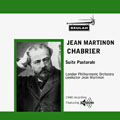
Modern recordings of the Suite Pastorale are thin on
the ground, so this reissue is welcome. Martinon was a fine
interpreter of French music of this vintage, excelled perhaps
only by Ernest Ansermet, whose own recording of the Suite
is available on a fine 2-CD collection from Australian Eloquence
(480 0049 - see review).
The Beulah transfer is good for its date, though inevitably
a little muffled.
Krauss conducts Strauss
Richard STRAUSS (1864-1949)
Don Juan Op.20 [15:36]
Johann STRAUSS II (1825-1899)
Die Fledermaus Overture [8:17]
Der Zigeunerbaron Overture [7:46]
Künstlerleben Waltz Op.316 [8:28]
Frühlingsstimmen Waltz Op.410 [6:26]
Josef STRAUSS (1827-1870)
Mein Lebenslauf ist Lieb und Lust Op.263 [7:01]
Johann and Josef STRAUSS
Pizzicato Polka [3:25]
Richard STRAUSS Till
Eulenspiegels lustige Streiche Op. 28 [13:22]
Vienna Philharmonic Orchestra/Clemens Krauss - rec. 1950-1.
ADD, mono
BEULAH 1PD97 [70:36] - available from iTunes
or eMusic
(both mp3)
Johann STRAUSS II (1825-1899)
Die Fledermaus Overture [8:17]
Der Zigeunerbaron Overture [7:46]
Künstlerleben Waltz Op.316 [8:28]
Frühlingsstimmen Waltz Op.410 [6:26]
Josef STRAUSS (1827-1870)
Mein Lebenslauf ist Lieb und Lust Op.263 [7:01]
Die Libelle Polka Mazurka [4:29]
Jockey Polka [1:53]
Johann STRAUSS II Im
Krapfenwald'l [4:02]
Eljen a Magyar [3:07]
G' schichten aus dem Wiener Wald [11:44]
Johann and Josef STRAUSS Pizzicato
Polka [3:16]
Ägyptischer Marsch [4:21]
Vergnügungszug [2:49]
Vienna Philharmonic Orchestra/Clemens Krauss - rec. 1950-1.
ADD/mono
BEULAH EXTRA 1BX97-13BX97 [73:19] - from Beulah
(mp3)
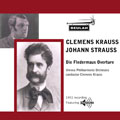 The
two Richard Strauss items used to be available on a very short
value Decca Ace of Clubs LP - rather poor value even at ACL
price, when a rival Philips recording fitted them on a 10-inch
LP. Here they take their place topping and tailing equally classic
Clemens Krauss performances of music by the Strauss family from
Willi Boskowsky’s predecessor at the helm of the VPO on New
Year’s Day. I’m not blessed (or cursed) with absolute pitch,
but I rather think that the transfer has cured the fact that
Till Eulenspiegel was recorded marginally sharp. The
performance is as cheeky as you are likely to hear, though Szell
runs Krauss pretty close on a better-engineered stereo recording,
also coupled with Don Juan and adding Tod und Verklärung,
which I recommended in May 2009 - a mere £2.07 from Amazon.co.uk,
so you can afford both that and the Beulah.
The
two Richard Strauss items used to be available on a very short
value Decca Ace of Clubs LP - rather poor value even at ACL
price, when a rival Philips recording fitted them on a 10-inch
LP. Here they take their place topping and tailing equally classic
Clemens Krauss performances of music by the Strauss family from
Willi Boskowsky’s predecessor at the helm of the VPO on New
Year’s Day. I’m not blessed (or cursed) with absolute pitch,
but I rather think that the transfer has cured the fact that
Till Eulenspiegel was recorded marginally sharp. The
performance is as cheeky as you are likely to hear, though Szell
runs Krauss pretty close on a better-engineered stereo recording,
also coupled with Don Juan and adding Tod und Verklärung,
which I recommended in May 2009 - a mere £2.07 from Amazon.co.uk,
so you can afford both that and the Beulah.
The Strauss family items on 1PD97 are also included in a series
of Beulah Extra downloads together with a number of other equally
attractive items. I’m especially pleased to see Josef, in many
ways the most talented member of the family, represented here.
Perhaps Beulah will also give us Josef’s Moulinet, Ohne
Sorgen and Feuerfest olkas, which appeared alongside
die Libelle and Jockey under Krauss’s baton on
a 10-inch Decca LP in 1954. The recordings are good for their
age, though unsurprisingly even Beulah can’t help that they
sound a little undernourished by modern standards. If you place
these recordings in one folder for continuous play, you may
need very carefully to change 1BX97 to 9BX97 to 01BX97, etc.
in Windows Explorer, in order to get the tracks to play in the
right order. Back the tracks up first, just in case you accidentally
delete one or more in the process.
Some of the same Strauss family items can be found in good transfers
on an Archipel 2-CD reissue of Krauss conducting the 1952-1954
New Year’s Day concerts (ARPCD0225, also available from
Passionato.com) which I recommended in April 2010 - see review.
Sir Edward ELGAR (1857-1934)
Violin Concerto in b minor, Op.61, to Fritz Kreisler: 'Aquí
está encerrada el Alma de .....'* [50:14]
Alternative Cadenza for the Violin Concerto, by the composer,
as performed by Marie Hall in the 1916 recording. Harp part
reconstructed from the original recording by Gwawr Owen* [6:17]
Interlude from ’t he Crown of India', Op. 66* [3:44]
Polonia, Op. 76, Symphonic Prelude à son ami I.J. Paderewski
[14:15]
Tasmin Little (violin)*; Royal Scottish National Orchestra/Sir
Andrew Davis
CHANDOS CHSA5083 [74:52] - from theclassicalshop.net
(mp3, lossless, 24-bit and surround-sound)
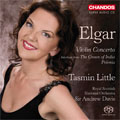 We
have had some very fine versions of the Elgar Violin Concerto
in recent years to challenge the hegemony of the classic Yehudi
Menuhin/Sir Edward Elgar recording (EMI 5669792) and the two
from Nigel Kennedy, of which I marginally prefer the first with
Vernon Handley (EMI 3457922 or CFP5751392). The new Chandos
recording with Tasmin Little and Sir Andrew Davis joins that
list of challengers and I enjoyed hearing it. Does it oust from
my affections Menuhin, Kennedy and James Ehnes, also with Sir
Andrew Davis (Onyx ONYX4025 - see November 2008 Roundup)?
Not quite - I didn’t engage with the performance as much as
with them, largely because of some occasional languor where
the music didn’t seem to be moving forward, though the overall
timings are a little faster than Kennedy/Handley. In sum, it’s
a delicate performance in keeping with Tasmin Little’s belief
that the dedicatee is Alice Wortley, nicknamed the Windflower.
I did think it at least as good as the version from Thomas Zehetmair
and Mark Elder (Hallé CDHLL7521 - see August 2010 Roundup).
Many will find it ideal - in some moods, I’d agree with them
- but Ehnes does the delicacy of the music equally well, while
maintaining the forward momentum.
We
have had some very fine versions of the Elgar Violin Concerto
in recent years to challenge the hegemony of the classic Yehudi
Menuhin/Sir Edward Elgar recording (EMI 5669792) and the two
from Nigel Kennedy, of which I marginally prefer the first with
Vernon Handley (EMI 3457922 or CFP5751392). The new Chandos
recording with Tasmin Little and Sir Andrew Davis joins that
list of challengers and I enjoyed hearing it. Does it oust from
my affections Menuhin, Kennedy and James Ehnes, also with Sir
Andrew Davis (Onyx ONYX4025 - see November 2008 Roundup)?
Not quite - I didn’t engage with the performance as much as
with them, largely because of some occasional languor where
the music didn’t seem to be moving forward, though the overall
timings are a little faster than Kennedy/Handley. In sum, it’s
a delicate performance in keeping with Tasmin Little’s belief
that the dedicatee is Alice Wortley, nicknamed the Windflower.
I did think it at least as good as the version from Thomas Zehetmair
and Mark Elder (Hallé CDHLL7521 - see August 2010 Roundup).
Many will find it ideal - in some moods, I’d agree with them
- but Ehnes does the delicacy of the music equally well, while
maintaining the forward momentum.
The most interesting of the fillers comes in the form of a reconstruction
of the cadenza employed for the 1916 recording with Marie Hall
as soloist, though it sounds a little odd in this detached form.
If it was worth preserving - which it is - why not embed it
in the main performance?
With so few versions of Polonia currently available,
I’m pleased to recommend this performance - it has all the vitality
that I found slightly lacking in the main course: it’s rather
as if the pudding were the highlight of this feast.
There were as yet no notes with the download when I checked,
though (oddly) the booklet is available from the Chandos web-page
for the CD.
Squeezebox owners should note that their equipment will play
Chandos 24/96 recordings, retaining the advantage of 24-bit
sound, though some of the advantage will be lost because (I
believe) Squeezebox will down-sample to 44kHz. I’m not sure
that the advantage over the lossless version is worth £6
extra cost.
Jean SIBELIUS (1865-1957)
Symphony No.1 in e minor, Op.39 [40:18]; Symphony No.3 in C,
Op.52 [29:36]
New Zealand Symphony Orchestra/Pietari Inkinen - rec. Wellington,
NZ, March 2009. DDD.
NAXOS 8.572305 [70:04] - from Classicsonline.com
(mp3)
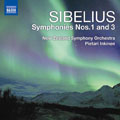 I
liked Pietari Inkinen’s earlier Naxos recording of Sibelius’s
Scènes historiques and King Christian II
Suites (8.570068 - see my review
and review
by Bob Briggs, who also welcomed the CD) and I also recommended
his recording of Night Ride and Sunrise, etc (8.570563,
Feb. 2009 Download
Roundup), so I expected good things of this new recording.
I was not seriously disappointed, but I thought both the performance
and the sound occasionally not quite the equal of the earlier
programme - the latter not a serious problem by any means, but
perhaps even 320kb/s mp3 can’t cope with Sibelius at full blast
and one needs the CD or a lossless download. You will probably
have to wait several months for that until Passionato.com, who
offer flac versions of most earlier Naxos recordings, catch
up with this issue. The coupling of the neo-Tchaikovskian but
unmistakably Sibelian First and the much sparser Third
is illuminating, especially as these performances reveal details
in both which I hadn’t noticed before.
I
liked Pietari Inkinen’s earlier Naxos recording of Sibelius’s
Scènes historiques and King Christian II
Suites (8.570068 - see my review
and review
by Bob Briggs, who also welcomed the CD) and I also recommended
his recording of Night Ride and Sunrise, etc (8.570563,
Feb. 2009 Download
Roundup), so I expected good things of this new recording.
I was not seriously disappointed, but I thought both the performance
and the sound occasionally not quite the equal of the earlier
programme - the latter not a serious problem by any means, but
perhaps even 320kb/s mp3 can’t cope with Sibelius at full blast
and one needs the CD or a lossless download. You will probably
have to wait several months for that until Passionato.com, who
offer flac versions of most earlier Naxos recordings, catch
up with this issue. The coupling of the neo-Tchaikovskian but
unmistakably Sibelian First and the much sparser Third
is illuminating, especially as these performances reveal details
in both which I hadn’t noticed before.
Other providers offer Naxos downloads, but only that from classicsonline
comes complete with excellent notes from Keith Anderson, which
are also available to subscribers to the Naxos Music Library:
I just wish that Naxos had given him more room to write about
the two symphonies, without repeating general biographical details.
Eric COATES (1866-1957)
The Merrymakers - a miniature Overture [4:39]
London Suite: Covent Garden [5:13]; Westminster [5:24]; Knightsbridge
[4:29]
Cinderella [15:53]
The Selfish Giant [11:05]
London Again: Oxford Street [3:31]; Langham Place [7:38]; Mayfair
[6:07]
Calling All Workers [3:26]
The Dam Busters - March [3:56]
Slovak Radio Symphony Orchestra/Adrian Leaper
MARCO POLO 8.223445 [71:21] - from Passionato.com
(mp3 and lossless) or Classicsonline.com
(mp3)
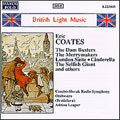 You
are almost bound to know some of the music here, especially
if you are of a certain age and remember the radio shows for
which Coates’ music was employed, such as Workers’ Playtime
and In Town Tonight, and the rest is well worth getting
to know. Those who wish to avoid duplication should note that
these performances of the Knightsbridge and Dam Busters
marches also appear on Elizabethan Serenade: the Best
of British Light Music (Naxos 8.553515) - see below.
You
are almost bound to know some of the music here, especially
if you are of a certain age and remember the radio shows for
which Coates’ music was employed, such as Workers’ Playtime
and In Town Tonight, and the rest is well worth getting
to know. Those who wish to avoid duplication should note that
these performances of the Knightsbridge and Dam Busters
marches also appear on Elizabethan Serenade: the Best
of British Light Music (Naxos 8.553515) - see below.
Béla BARTÓK (1881-1945) The Two
Violin Concertos
Violin Concerto No.2 (BB117) [39:49]; Violin Concerto No.1 (BB48a)
[21:21]
Arabella Steinbacher (violin); Orchestre de la Suisse Romande/Marek
Janowski. (P) and © 2010. DSD.
PENTATONE PTC5186350 [61:11] - from eMusic
or Classicsonline.com
(both mp3)
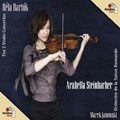 These
performances now head my list of recorded versions of these
works, even in preference to Kyung-Wha Chung and Georg Solti
on Double Decca (473 2712, with the Piano Concertos). The eMusic
bit-rate ranges from 224 to 320kb/s, but the resulting sound
is never less than fully adequate.
These
performances now head my list of recorded versions of these
works, even in preference to Kyung-Wha Chung and Georg Solti
on Double Decca (473 2712, with the Piano Concertos). The eMusic
bit-rate ranges from 224 to 320kb/s, but the resulting sound
is never less than fully adequate.
Those who don’t subscribe to eMusic may find a recommendable
alternative in the Naxos recording of both concertos (8.554321,
György Pauk/Polish RSO/Antoni Wit), available from Passionato.com
and Classicsonline.
Strings in the Earth and Air
Ernest J MOERAN (1894-1950) Six
Folksongs from Norfolk (1923) [14:23]; Seven Songs of James
Joyce (1929) [12:00]
Peter WARLOCK (1894-1930)
Candlelight: a Cycle of Nursery Jingles (1923) [8:36]; Along
the Stream [3:10]; Three Songs (1916/17): Take, o take those
lips away [2:14]; Heracleitus [3:40]; The Fox [3:19]
Geoffrey STERN (1935-2005)
Three Wordsworth Songs (1953) [8:12]; Four Songs of James Joyce
(2001-5) [11:39]; Legend (1960) [1:21]
Paul Martyn-West (tenor); Nigel Foster (piano) - rec, 2005.
DDD.
Booklet with texts available as pdf download.
DIVINE ART DIVERSIONS DDV24152 [68:43] - from
theclassicalshop.net (mp3 and lossless)
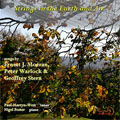 Suitably
understated performances of mostly quiet and understated music.
There are no undiscovered masterpieces here, but it’s all well
worth hearing, especially as I had not even heard of Geoffrey
Stern before, from the second of whose Four Songs of James
Joyce the overall title of the collection is taken. With
idiomatic performances and good recording, this is well worth
seeking out by lovers of English song looking for something
unusual. It comes complete with a booklet of notes and all for
a bargain £4.99 (mp3) or £7.99 (various lossless
formats) from theclassicalshop.net.
Suitably
understated performances of mostly quiet and understated music.
There are no undiscovered masterpieces here, but it’s all well
worth hearing, especially as I had not even heard of Geoffrey
Stern before, from the second of whose Four Songs of James
Joyce the overall title of the collection is taken. With
idiomatic performances and good recording, this is well worth
seeking out by lovers of English song looking for something
unusual. It comes complete with a booklet of notes and all for
a bargain £4.99 (mp3) or £7.99 (various lossless
formats) from theclassicalshop.net.
The recital was originally issued on Dunelm DRD0249 - see reviews
by Em Marshall here
and John France here.
Dmitri SHOSTAKOVICH (1906-1975)
Symphony No.10 in e minor, Op.93 (1953) [52:11]
Royal Liverpool Philharmonic Orchestra/Vasily Petrenko - rec.
Philharmonic Hall Liverpool, 11-12 September 2009. DDD
NAXOS 8.572461 [52:11] - from Classicsonline.com
(mp3)
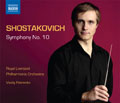 There’s
a growing belief that this is Shostakovich’s greatest symphony
and I’m strongly inclined to agree, especially after hearing
this new performance: it presses all the right buttons, in both
the powerful and the more thoughtful passages, and the recording,
though offered in mp3 only, is first-rate.
There’s
a growing belief that this is Shostakovich’s greatest symphony
and I’m strongly inclined to agree, especially after hearing
this new performance: it presses all the right buttons, in both
the powerful and the more thoughtful passages, and the recording,
though offered in mp3 only, is first-rate.
Petrenko’s Shostakovich cycle is gradually but definitively
replacing some rather unsatisfactory older versions on Naxos.
Apart from the Eighth, where I was slightly less impressed,
this is rapidly becoming my Shostakovich of choice, though there
is very strong competition in the Tenth, from Semyon
Bychkov (Avie SACD AV2137 - Recording of the Month: see review
- download from Passionato here),
Neeme Järvi (Chandos CHAN8630 - from theclassicalshop here),
Rostropovich (Warner Elatus 2564 61568-3) and Karajan (DG Originals
477 5909 or DG Gold 4390362 - from Passionato.com here
or here).
Miklós RÓZSA (1907-1995)
Viola Concerto, Op 37 (1980-84) [32:31]
Béla BARTÓK (1881-1945)
Viola Concerto, Sz120 (edited and completed by Tibor Serly)
(1945) [21:33]
Tibor SERLY (1901-1978)
Rhapsody for viola and orchestra (1946-48) [8:54]
Lawrence Power (viola); Bergen Philharmonic Orchestra/Andrew
Litton - rec. August 2009. DDD.
HYPERION CDA67687 [62:44] - from Hyperion
(mp3 and lossless)
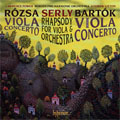 There’s
some snazzy artwork on offer here and a download price of just
£6.99 in either format to tempt the prospective purchaser.
More to the point, the performances are excellent, all the music
well worth hearing, not just the more familiar Bartók
Concerto, and the download sound is first-class. I’m particularly
pleased to see Tibor Serly represented in his own right, not
just as the editor of the Bartók Concerto, and equally
pleased to see Miklós Rózsa coming into his own
these days for more than his film music.
There’s
some snazzy artwork on offer here and a download price of just
£6.99 in either format to tempt the prospective purchaser.
More to the point, the performances are excellent, all the music
well worth hearing, not just the more familiar Bartók
Concerto, and the download sound is first-class. I’m particularly
pleased to see Tibor Serly represented in his own right, not
just as the editor of the Bartók Concerto, and equally
pleased to see Miklós Rózsa coming into his own
these days for more than his film music.
Leroy ANDERSON (1908-1975) Orchestral
Music: Volume 3
Harvard Sketches (Lowell House Bells -Freshman in Harvard Square
- Widener Reading Room - Class Day Confetti Battle) [4:49];
Melody on 2 Notes [1:55]; Mother’s Whistler [3:30]; The Penny-Whistle
Song [2:38]; The Phantom Regiment [3:09]; Plink, Plank, Plunk!
[2:49]; Promenade [2:47]; Sandpaper Ballet [3:18]; Sarabande
[3:36]; Serenata
[3:54]; Old Macdonald had a Farm [3:16 ]; The Music Man: 76
Trombones [2:57]; Sleigh Ride [2:47]; Suite of Carols (version
for brass) [11:42];
George GERSHWIN (arr. ANDERSON)
Of Thee I sing: Wintergreen for President [1:25];
Leroy ANDERSON The Typewriter
[1:43]; A Trumpeter’s Lullaby [3:08]; The Syncopated Clock [2:26]
BBC Concert Orchestra/Leonard Slatkin
NAXOS 8.559357 [61:49] - from Passionato.com (mp3 and
lossless) and Classicsonline.com
(mp3)
The Girl in Satin [2:09]; Song of the Bells [3:00]; The Typewriter
[1:35]; Bugler’s Holiday [2:27]; Summer Skies [2:33]; Forgotten
Dreams [2:10]; Sandpaper Ballet [3:15]; The First Day of Spring
[2:57]; Scottish Suite (excerpts): III. The Bluebells of Scotland
[2:14]; II. Turn Ye To Me [3:18]; Irish Suite (arr. L. Anderson):
I. The Irish Washerwoman [2:37]; II. The Minstrel Boy [3:50];
III. The Rakes of Mallow [3:04]; IV. The Wearing of the Green
[3:05]; V. The Last Rose of Summer [3:24]; VI. The Girl I Left
behind Me [3:05]
Leroy Anderson Pops Concert Orchestra/Leroy Anderson - rec.
1952-4. Mono/ADD.
NAXOS CLASSICAL ARCHIVES 9.80764 [44:43] - from Classicsonline.com
(mp3). Not available in USA.
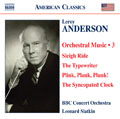 I
recommended Volumes 4 and 5 of the complete Naxos Leroy Anderson
series two years ago (December 2008 Roundup) and the third volume
is equally good. I make one small reservation, however, in favour
of another download from classicsonline, Anderson’s own recordings
from 1952 and 1954, still sounding extremely well and adding
an extra touch of joie de vivre. The difference is especially
I
recommended Volumes 4 and 5 of the complete Naxos Leroy Anderson
series two years ago (December 2008 Roundup) and the third volume
is equally good. I make one small reservation, however, in favour
of another download from classicsonline, Anderson’s own recordings
from 1952 and 1954, still sounding extremely well and adding
an extra touch of joie de vivre. The difference is especially
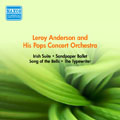 noticeable
in the case of The Typewriter and Sandpaper Ballet,
where the unconventional solo 'instruments’ are almost inaudible
on the newer recording, but can be clearly heard in the excellent
Naxos Classical Archive transfer. It may offer short value,
but it can be yours in the UK for £1.99. Those unable
to obtain the vintage versions because of copyright laws will,
however, be content with the Slatkin recording.
noticeable
in the case of The Typewriter and Sandpaper Ballet,
where the unconventional solo 'instruments’ are almost inaudible
on the newer recording, but can be clearly heard in the excellent
Naxos Classical Archive transfer. It may offer short value,
but it can be yours in the UK for £1.99. Those unable
to obtain the vintage versions because of copyright laws will,
however, be content with the Slatkin recording.
William SCHUMAN (1910-1992)
Violin Concerto (1947) [33:12]
New England Triptych (1956): Be Glad then America; When Jesus
Wept; Chester [16:22]
CHARLES IVES Variations
on 'America' (1891-2) (orch SCHUMAN) [7:19]
Philippe Quint (violin); Bournemouth Symphony Orchestra/José
Serebrier - rec. 2000. DDD.
NAXOS 8.559803 [56:54] - from Classicsonline.com
(mp3)
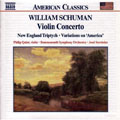 Schuman’s
music has its more angular moments, but if you can warm to,
say, the Berg Violin Concerto, you won’t be daunted by
Schuman’s concerto for the same instrument. The New England
Triptych, perhaps his best-known work, is even more approachable
and thoroughly enjoyable: it was hearing a performance of this
piece on BBC Radio 3 that reminded me what beautiful music it
contains, comparable with Copland at his best. Schuman’s orchestration
of Ives’ Variations on 'America' (the same tune as 'God save
the Queen') brings the house down at the end. With excellent
performances and recording, well transferred in good mp3 sound,
this is a thoroughly recommendable introduction to Schuman’s
music - it was especially good value at a reduced price of £3.99
when I checked.
Schuman’s
music has its more angular moments, but if you can warm to,
say, the Berg Violin Concerto, you won’t be daunted by
Schuman’s concerto for the same instrument. The New England
Triptych, perhaps his best-known work, is even more approachable
and thoroughly enjoyable: it was hearing a performance of this
piece on BBC Radio 3 that reminded me what beautiful music it
contains, comparable with Copland at his best. Schuman’s orchestration
of Ives’ Variations on 'America' (the same tune as 'God save
the Queen') brings the house down at the end. With excellent
performances and recording, well transferred in good mp3 sound,
this is a thoroughly recommendable introduction to Schuman’s
music - it was especially good value at a reduced price of £3.99
when I checked.
William SCHUMAN
Symphony No. 4 (1941) [24:50]
Orchestra Song (1963) [2:59]
Circus Overture (1944) [7:53]
Symphony No. 9 'Le fosse ardeatine' (1968) [27:43]
Seattle Symphony/Gerard Schwarz - rec. 2003 and 2004. DDD.
NAXOS 8.559254 [63:25] - from Classicsonline.com
(mp3) and Passionato.com
(mp3 and lossless)
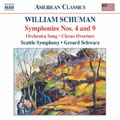 If
the Naxos recording of the Violin Concerto and New
England Triptych offers the ideal introduction to Schuman’s
music, their series of recordings of the symphonies, of which
this was the first, offers an excellent follow-up. Once again
performance and recording are ideal and this is also available
in lossless sound from Passionato, but at a cost equivalent
to (or a little more than) the parent CD. The classicsonline
download was on offer at £3.99 when I checked: it comes
with the booklet, also available to subscribers to the Naxos
Music Library.
If
the Naxos recording of the Violin Concerto and New
England Triptych offers the ideal introduction to Schuman’s
music, their series of recordings of the symphonies, of which
this was the first, offers an excellent follow-up. Once again
performance and recording are ideal and this is also available
in lossless sound from Passionato, but at a cost equivalent
to (or a little more than) the parent CD. The classicsonline
download was on offer at £3.99 when I checked: it comes
with the booklet, also available to subscribers to the Naxos
Music Library.
Malcolm ARNOLD (1921-2006) Ballet
Music
Suite from 'Homage to the Queen' (1953) [19:43]
Rinaldo and Armida (1954) [20:57]
Concert Suite from ’sweeney Todd' (1959) [20:57]
Electra (1963) [14:49]
BBC Philharmonic Orchestra/Rumon Gamba
rec. 9-10 December 2008, Studio 7, New Broadcasting House, Manchester,
UK. DDD
CHANDOS CHAN10550 [76:14] from theclassicalshop.net
(mp3, lossless and 24bit/96kHz)
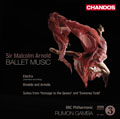 I
reviewed this recording in lossless sound some time ago and
thought it another recommendable co-operation between Chandos
and the BBC Phil/Rumon Gamba - see November 2009 Download
Roundup, but I’m glad to add a substantial post-script from
Dan Morgan, who has been listening to the better-than-CD 24-bit
version:
I
reviewed this recording in lossless sound some time ago and
thought it another recommendable co-operation between Chandos
and the BBC Phil/Rumon Gamba - see November 2009 Download
Roundup, but I’m glad to add a substantial post-script from
Dan Morgan, who has been listening to the better-than-CD 24-bit
version:
Malcolm Arnold’s music may be neglected in our concert halls,
but at least we have the excellent Rumon Gamba/BBC Phil series
as compensation. Their disc of overtures - review
- is very enjoyable, helped in no small measure by Chandos’
superb sonics. I had high hopes for these ballet suites and,
after hearing this 24bit/96kHz download, I can say these expectations
have been more than comfortably met.
The subdued, ear-pricking start to the suite from 'Homage to
the Queen' gives way to one of those insouciant Arnoldian tunes,
the orchestra set in a wide, deep acoustic. Strings are silky
smooth, the brass bracing without being overbearing. Indeed,
that’s a good metaphor for the recording as a whole - balances
are entirely natural and, in the quiet third movement, even
the tiniest details are easily discerned. And there’s bags of
personality in this performance too, pizzicato strings as perky
as one could wish for, the bass drum in the fourth movement
weighty and well defined. After the gentle dignity of the fifth
movement comes a swashbuckling finale, Korngoldian in its filmic
sweep. What a terrific curtain-raiser this is.
Gamba and his band are alive to the shifting moods and colours
of 'Rinaldo and Armida', textures now dark and forbidding, now
light and airy. But it’s the poise of this lovely score that’s
most alluring; even the drum-punched, cymbal-capped tuttis in
the final movement are judiciously done, expanding without a
hint of stress or strain. Ditto the extremes of ’sweeney Todd',
which I remember most vividly from Tod Handley’s fine Conifer
recording. As for that typically Arnoldian blend of raw energy
and sauntering tunes, it’s even more entertaining this time
round, the BBC Phil playing with fantastic precision and point
throughout.
A trouper to the end, Arnold knew the benefit of leaving his
audiences wanting more, so I’m pleased to say these suites don’t
ever outstay their welcome. Yes, he reshuffles and recycles
his tunes but the music is never less than engaging. That’s
certainly true of the suite from 'Electra', the start of which
creeps the flesh as much as any fin-de-siècle potboiler
by Richard Strauss. Certainly the wild, hypnotic dances and
pounding rhythms bring to mind the latter’s’Salome' and 'Elektra',
the BBC Phil providing all the thrust and amplitude this music
requires. That said, Gamba never allows things to sound incoherent
or overdriven, and that’s a big plus in a febrile score such
as this. But it’s the long bell- and drum-tormented passage
in the final movement that puts the final seal on this spectacular
performance and recording.
This and Chandos’ 24bit/96kHz download of Casella’s Second Symphony
are proof that music bought and auditioned this way is now every
bit as viable and satisfying as owning a shiny plastic disc.
If you have the right equipment and don’t mind paying the eye-watering
premium Chandos charge for these files, then this is where your
next audio adventure begins.
Dan Morgan
Arvo PÄRT (b.1935)
Litany (Prayers of St John Chrysostom) [22:45]; Psalmon
[6:45]; Trisagion [11:43]
The Hilliard Ensemble; Tallinn Chamber Orchestra/Tönu Kaljuste;
Lithuanian Chamber Orchestra/Saulius Sondereckis - rec. c.1996.
DDD.
ECM NEW SERIES 449 8102 [41:23] - from
eMusic (mp3)
Fratres for violin and piano* [11:26]; Cantus
in Memory of Benjamin Britten+ [5:00]; Fratres for 12 cellos++
[11:51]; Tabula rasa** [26:08]
*Gidon Kremer (violin), *Keith Jarrett (piano); **Lithuanian
Chamber Orchestra; +Staatsorchester Stuttgart; ++Cellists of
the Berlin Philharmonic Orchestra - rec. 1977-1984.
ECM NEW SERIES ECM 817 7642 [54:25] - from eMusic
(mp3)
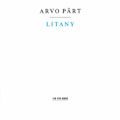 These
are two of the more easily assimilated recordings of Arvo Pärt’s
music on the ECM New Series label, which has done so much to
champion the composer’s works, helping Cantus to become something
of a modern classic already. The recordings offer rather short
value, but they are offered on just three tracks and four tracks
respectively, potentially each less than £1, which goes
a long way to make amends. Enthusiasts of Pärt’s music
will find more to explore from the ECM catalogue on eMusic.
The lack of notes can be remedied by a visit to the ECM Records
website.
(Click on 'background information' for each recording.)
These
are two of the more easily assimilated recordings of Arvo Pärt’s
music on the ECM New Series label, which has done so much to
champion the composer’s works, helping Cantus to become something
of a modern classic already. The recordings offer rather short
value, but they are offered on just three tracks and four tracks
respectively, potentially each less than £1, which goes
a long way to make amends. Enthusiasts of Pärt’s music
will find more to explore from the ECM catalogue on eMusic.
The lack of notes can be remedied by a visit to the ECM Records
website.
(Click on 'background information' for each recording.)
Steve REICH (b.1936) Music
for 18 Musicians (1974-75)
Bob Becker; Virgin Blackwell; David Van Tieghem; Glen Velez;
Shem Guibbory; Pamela Fraley; Gary Schall; Nurit Tilles; Russ
Hartenberger; Larry Karush; Rebecca Armstrong; Steve Chambers;
Elizabeth Arnold; Ken Ishii; James Preiss; Richard Cohen; Jay
Clayton/Steve Reich - rec.1978. ADD.
ECM NEW SERIES 821 417-2 [56:31] - from eMusic
(mp3)
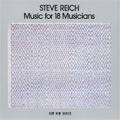 Incredibly,
this comes as just one track from eMusic, which has to rank
as the bargain of bargains, especially for subscribers still
on the £11.99 for 50 tracks tariff, for whom it costs
24p. Even for new subscribers at 42p per track, it’s worth trying
out: if you don’t like it - and not everyone goes for Reich’s
minimalism, especially 57 minutes of it, as much as I do - you
haven’t wasted much. Give it a chance and it proves as hypnotic
as plainsong or Buddhist chant. The recording is good. The composer’s
own detailed notes on the music are online here.
Incredibly,
this comes as just one track from eMusic, which has to rank
as the bargain of bargains, especially for subscribers still
on the £11.99 for 50 tracks tariff, for whom it costs
24p. Even for new subscribers at 42p per track, it’s worth trying
out: if you don’t like it - and not everyone goes for Reich’s
minimalism, especially 57 minutes of it, as much as I do - you
haven’t wasted much. Give it a chance and it proves as hypnotic
as plainsong or Buddhist chant. The recording is good. The composer’s
own detailed notes on the music are online here.
Christopher GUNNING (b.1944)
Poirot Variants for Alto Saxophone and Orchestra [8:53]
Le Mome Piaf (la Vie En Rose) [6:17]
Under Suspicion [7:00]
Cold Lazarus [10:15]
The Rosemary and Thyme Caprice [3:59]
Rebecca [6:38]
Pollyanna [6:17]
Firelight [7:14]
When the Whales Came [7:12]
The Hollow [3:14]
Five Little Pigs [3:33]
Lighthouse Hill [4:27]
Martin Robertson (saxophone); Matthew Compton (accordion); Julia
Bradshaw (cello); Yuri Torchinski (violin); Nicole Tibbles (sopranos)
BBC Philharmonic/Rumon Gamba - rec. July 2009, January and June
2010. DDD.
CHANDOS CHAN10625 [75:50] - from theclassicalshop.net
(mp3, lossless and 24-bit)
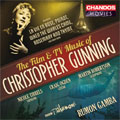 For
me the highlight of this new recording is the first item, based
on the Poirot television theme which, inexplicably, no
longer seems to be used for the programme, though it can, of
course be heard on the repeats of the earlier editions (ITV3
in the UK). Gunning takes the comparatively short theme from
the opening and closing moments and weaves it into an enchanting
set of variations for saxophone and orchestra. The rest of the
music may be rather less well-known, but it’s all very well
worth hearing. Gamba and the BBC Philharmonic once again prove
how adept they are in performing film and television music,
and the recording is excellent - as well as mp3 and lossless
it’s also available in better-than-CD quality 24/96 sound as
a download. Please see also the more detailed review by MWI
Classical Editor Rob Barnett here.
For
me the highlight of this new recording is the first item, based
on the Poirot television theme which, inexplicably, no
longer seems to be used for the programme, though it can, of
course be heard on the repeats of the earlier editions (ITV3
in the UK). Gunning takes the comparatively short theme from
the opening and closing moments and weaves it into an enchanting
set of variations for saxophone and orchestra. The rest of the
music may be rather less well-known, but it’s all very well
worth hearing. Gamba and the BBC Philharmonic once again prove
how adept they are in performing film and television music,
and the recording is excellent - as well as mp3 and lossless
it’s also available in better-than-CD quality 24/96 sound as
a download. Please see also the more detailed review by MWI
Classical Editor Rob Barnett here.
The Christmas Collection
 The
Sixteen/Harry Christophers - rec.1990-92. DDD.
The
Sixteen/Harry Christophers - rec.1990-92. DDD.
CORO COR16054 [199:01] - from Passionato.com
(mp3 and lossless)
Includes the contents of:
Hodie: an English Christmas Collection (COR16004)
[58:13] - also available separately from Passionato.com
(mp3 and lossless) and Classicsonline.com
(mp3)
Christus natus est: an Early English Christmas (COR16027)
[71:10] - also available separately from Passionato.com
(mp3 and lossless) and Classicsonline.com
(mp3)
A Traditional Christmas Collection (COR16043) [69:38]
- also available separately from Passionato.com
(mp3 and lossless) and Classicsonline.com
(mp3)
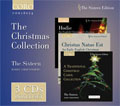 The
3-CD set comes at a saving over the individual programmes, but
these remain available separately for anyone who already owns
one or more of them. I recommended Hodie last year -
see review
and review
by Jonathan Woolf. The highlight of that programme is the excellent
performance of Britten’s Hymn to the Virgin and Ceremony
of Carols. The highlights of Christus natus est are
Sheppard’s Gloria and Byrd’s Lullaby, my sweet little
baby, while the Traditional Collection contains pretty well
what you would expect, from The first Nowell on the first
track and Once in Royal David’s City on the second to
Hark! The Herald Angels Sing on the last, with a few
less obvious items in between, such as the Coventry Shepherds’
Carol. The albums are available only separately and in mp3
only from Classicsonline.com, but they come with booklets, as
they also do for subscribers to the Naxos Music Library, unlike
the booklet-less Passionato downloads. Classicsonline and the
Naxos Library also have the new Traditional Christmas Collection
(2) on COR16085 here.
The
3-CD set comes at a saving over the individual programmes, but
these remain available separately for anyone who already owns
one or more of them. I recommended Hodie last year -
see review
and review
by Jonathan Woolf. The highlight of that programme is the excellent
performance of Britten’s Hymn to the Virgin and Ceremony
of Carols. The highlights of Christus natus est are
Sheppard’s Gloria and Byrd’s Lullaby, my sweet little
baby, while the Traditional Collection contains pretty well
what you would expect, from The first Nowell on the first
track and Once in Royal David’s City on the second to
Hark! The Herald Angels Sing on the last, with a few
less obvious items in between, such as the Coventry Shepherds’
Carol. The albums are available only separately and in mp3
only from Classicsonline.com, but they come with booklets, as
they also do for subscribers to the Naxos Music Library, unlike
the booklet-less Passionato downloads. Classicsonline and the
Naxos Library also have the new Traditional Christmas Collection
(2) on COR16085 here.
In Brief
A New Heaven
Hubert PARRY (1848-1918) I
was glad [5:41]
Charles WOOD (1866-1926)
O thou the central orb [4:09]
William Henry HARRIS (1883-1973)
Faire is the heaven [5:21]
Charles Villiers STANFORD (1852-1924)
Beati quorum via [3:34]
Edward BAIRSTOW (1874-1946)
Blessed city [9:05]
Hubert PARRY (1848-1918)
Jerusalem [2:53]
Henry BALFOUR GARDINER (1877-1950)
Evening Hymn [6:44]
Howard GOODALL (b.1958) The
Lord is my Shepherd [3:18]
Edgar BAINTON (1880-1956) And
I saw a new heaven [5:14]
Hubert PARRY (1848-1918)
My soul, there is a country [4:00]
John STAINER (1840-1901)
I saw the Lord [7:13]
Herbert HOWELLS (1892-1983)
Like as the Hart [6:33]
Charles WOOD (1866-1926)
Hail, gladdening light [3:19]
John RUTTER (b.1944) The
Lord is my Shepherd [4:53]
The Sixteen/Harry Christophers - rec. 2008. DDD
UNIVERSAL CLASSICS & JAZZ 179 5732 [72:04] - from
Passionato.com
(mp3 and lossless)
"Of the many discs of English anthems I’ve been lucky enough
to hear and review, few have been quite as good as this."
(see full review
by Em Marshall, with links to further reviews by John
Quinn - "makes a strong claim for the attention of
collectors" - and Michael
Cookson - "indispensable listening".) I need add
only that the lossless download is excellent. Bear in mind,
however, that at the time of writing, though most retailers
were charging full price for the CD, I have seen it on offer
for as little as £4.99, which even undercuts the download
price.
Light Music
Elizabeth Serenade: The Best of British Light Music
Eric COATES By the Sleepy Lagoon
[3:47]
Frederic CURZON March of
the Bowmen [4:51]
Albert KETÈLBEY
Bells across the Meadows [5:14]
Vivian ELLIS Coronation
Scot [3:00]
Haydn WOOD Sketch of a Dandy
[3:27]
Robert FARNON Westminster
Waltz [2:58]
Trevor DUNCAN Little Suite
- March [3:04]
Ronald BINGE Sailing by
[2:39]
Arthur BENJAMIN Jamaican
Rumba [2:27]
Eric COATES Knightsbridge
March [4:28]
Albert KETÈLBEY In
a Monastery Garden [6:20]
Ernest TOMLINSON Little
Serenade [3:22]
Haydn WOOD Roses of Picardy
[5:57]
Edward WHITE Puffin' Billy
[3:08]
Ronald BINGE Elizabethan
Serenade [3:37]
Edward GERMAN Tom Jones
Waltz [3:06]
Anthony COLLINS Vanity Fair
[3:48]
Billy MAYERL Marigold [3:31]
Albert KETÈLBEY In
a Persian Market [5:38]
Eric COATES The Dam Busters
March [3:57]
Slovak Radio Symphony Orchestra/Andrew Penny, Adrian Leaper,
Gary Carpenter; RTE Concert Orchestra/Eric Tomlinson - rec.
1990s. DDD.
NAXOS 8.553515 [78:19] - from
Passionato.com (mp3) and Classicsonline.com
(mp3)
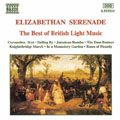 This
is an excellent selection from several Marco Polo and Naxos
recordings of British light music - my only reservation is that
I have already recommended the parent discs from which several
of these recordings are taken, including the Marco Polo Eric
Coates CD, from which the Knightsbridge and Dam Busters
marches are included here (see above).
This
is an excellent selection from several Marco Polo and Naxos
recordings of British light music - my only reservation is that
I have already recommended the parent discs from which several
of these recordings are taken, including the Marco Polo Eric
Coates CD, from which the Knightsbridge and Dam Busters
marches are included here (see above).
British Light Miniatures: Vintage TV and Radio Classics
Ralph VAUGHAN WILLIAMS Sea
Songs March [3:51]
Billy MAYERL Marigold [3:58]
Gilbert VINTER Waltzing
with Sullivan [5:08]
Eric COATES Sound and Vision
March [3:32]
Fritz SPIEGL Radio 4 UK
Theme [5:29]
Clive RICHARDSON the Holiday
Spirit [3:04]
Arnold SAFRONI Imperial
Echoes March [3:01]
Ivor SLANEY Top Dog (the
Men from the Ministry) [1:56]
Archibald JOYCE One thousand
Kisses [4:03]
Woolf PHILLIPS Parisian
Mode [2:29]
Cyril WATTERS Willow Waltz
[3:27]
John MALCOLM Non-Stop (ITN
News) [3:05]
George MELACHRINO Winter
Sunshine [3:25]
William HILL-BOWEN Paris
Promenade [2:36]; Paris Metro [2:36]
Hubert BATH Out Of the Blue
March [4:03]
Ashworth HOPE Barnacle Bill
(Blue Peter) [2:39]
Alan LANGFORD A Little French
Suite [2:54]
Montague PHILLIPS Dance
Revels [10:20]
John DANKWORTH Widespread
World (London Rediffusion) [4:13]
Royal Philharmonic Orchestra/Gavin Sutherland
NAXOS 8.570332 [75:49] - from Passionato.com
(mp3 and lossless) and Classicsonline.com
(mp3)
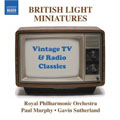
Older listeners will enjoy trying to remember the programmes
to which the music was attached. Everyone can sit back and enjoy
some well-shaped music in a lighter vein.
British Light Music Classics: Volume 3
Haydn WOOD Montmartre [3:47]
Clive RICHARDSON, arr Ronald
HANMER Melody on the Move [2:42]
Jack STRACHEY In Party Mood
[4:01]
'Trevor DUNCAN' The Girl
from Corsica [4:37]
Lionel MONCKTON Soldiers
in the Park [3:51]
'Felix GODIN', arr Adolf
LOTTER Valse Septembre [5:22]
Ronald BINGE Miss Melanie
[2:25]
Ivan CARYLL Pink Lady Waltz
[5:25]
Robert FARNON Portrait of
a Flirt [2:44]
Harry DEXTER Siciliano [4:37]
Albert KETÈLBEY In
a Persian Market [6:15]
Jack STRACHEY Theatreland
[3:19]
Archibald JOYCE Songe
d'Automne [4:46]
Vivian ELLIS, arr Sidney
TORCH Alpine Pastures
[3:40]
Ernest TOMLINSON Little
Serenade [3:31]
George MELACHRINO Woodland
Revel [3:10]
Tolchard EVANS, arr Fred
HARTLEY/Ken WARNER Lady of Spain [3:02]
Charles ANCLIFFE Smiles,
then Kisses [4:26]
Sidney TORCH On a Spring
Note [2:31]
Eric COATES Music Everywhere
'Rediffusion March' [3:20]
The New London Orchestra/Ronald Corp
HYPERION CDA67148 [78:50] - from Hyperion
(mp3 and lossless)
British Light Music Classics Volume 4
'Marshall ROSS’
Marching Strings (Top of the Form) [2:45]
Peter HOPE The Ring of Kerry
- Jaunting Car [2:46]
'Trevor DUNCAN' High Heels
[3:13]
Frederic CURZON Dance of
an Ostracised Imp [3:21]
John FOULDS A Keltic Suite,
Op 29 - Keltic Lament [4:14]
Charles WILLIAMS Rhythm
on Rails [2:47]
Eric COATES By the Sleepy
Lagoon [4:03]
Arthur BENJAMIN Jamaican
Rumba [2:06]
Albert W KETÈLBEY
In a Monastery Garden [5:53]
Charles WILLIAMS A Quiet
Stroll [2:55]
Percy FLETCHER Parisian
Sketches No 1 - Demoiselle Chic [3:59]
Jack BEAVER Cavalcade of
Youth [3:40]
Fredric BAYCO Elizabethan
Masque [2:16]
Henry Balfour GARDINER Shepherd
Fennel’s Dance [5:31]
Charles ANCLIFFE Thrills
[6:04]
Frederick ROSSE The Merchant
of Venice - The Doge’s March [4:55]
Samuel COLERIDGE-TAYLOR
Petite Suite de Concert Op 77 [15:40]
The New London Orchestra/Ronald Corp
HYPERION CDA67400 [77:51] - from Hyperion
(mp3 and lossless)
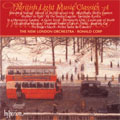 Volumes
Three and Four of the British Light Music series are just as
recommendable as the first two volumes which I included in my
choice of 30 Best Hyperion recordings, even allowing for the
fact that there is some overlap, especially on Volume 4, with
the Naxos and Marco Polo light music CDs. (How many Jamaican
Rumbas do you want?) The Hyperions are deleted as CDs, except
in a box set, but the downloads remain available separately.
This is ideal music for the mp3 player, but the mp3 versions
sound just as good on more serious equipment - the iTunes player
can’t cope with flac.
Volumes
Three and Four of the British Light Music series are just as
recommendable as the first two volumes which I included in my
choice of 30 Best Hyperion recordings, even allowing for the
fact that there is some overlap, especially on Volume 4, with
the Naxos and Marco Polo light music CDs. (How many Jamaican
Rumbas do you want?) The Hyperions are deleted as CDs, except
in a box set, but the downloads remain available separately.
This is ideal music for the mp3 player, but the mp3 versions
sound just as good on more serious equipment - the iTunes player
can’t cope with flac.
American Light Music Classics
John Philip SOUSA: the Washington
Post [3:02]
Kerry MILLS: Whistling Rufus
[3:11]
Morton GOULD: Pavane [3:53]
Felix ARNDT: Nola - a Silhouette
[3:29]
Arthur PRIOR: the Whistler
and His Dog [2:50]
Leroy ANDERSON: Belle of
the Ball [2:51]
The Arkansas Traveler - Old Fiddlers’ Breakdown [2:33]
John W BRATTON: the Teddy
Bears’ Picnic [3:10]
Edward MACDOWELL: to a Wild
Rose [2:09]
Abe HOLZMANN:
Blaze Away! [3:46]
Rudolph FRIML: Chanson
'in Love' [2:28]
Raymond SCOTT: the Toy Trumpet
[3:13]
George GERSHWIN: Promenade
[2:51]
Leroy ANDERSON: Plink, Plank,
Plunk! [2:28]
Victor HERBERT: the March
of the Toys [3:55]
David ROSE: Holiday for
Strings [3:14]
Ethelbert NEVIN: Narcissus
[2:26]
Don GILLIS: a Symphony for
Fun (No.5½) [14:07]
Richard RODGERS: the Carousel
Waltz [7:47]
The New London Orchestra/Ronald Corp
HYPERION CDA67067 [73:22] - from Hyperion
(mp3 and lossless)
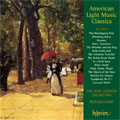
Listeners on either side of the pond will recognise some of
these pieces, but there’s some unfamiliar repertoire here, too,
all of it as thoroughly enjoyable as the British music series.
Mantovani at the Movies
Alex NORTH
Unchained - Unchained Melody [2:16]
Henry MANCINI Breakfast
at Tiffany’s - Moon River [2:39]
Harold ARLEN the Wizard
of Oz - Somewhere over the Rainbow [3:07]
Jule STYNE Three Coins in
the Fountain [3:40]
Charles CHAPLIN Limelight
- theme [2:59]
Sammy FAIN Love is a many-splendored
thing [4:00]; April Love [3:59]
Neil YOUNG Around the World
in 80 days [2:03]
Sammy FAIN A certain Smile
[3:33]
Elmer BERNSTEIN The Magnificent
Seven - theme [1:58]
Max STEINER Gone with the
Wind - Tara’s theme [3:28]
Mikis THEODORAKIS Zorba
the Greek - main theme [3:50]
John BARRY Goldfinger [2:39];
You Only Live Twice [2:42]
Maurice JARRE Lawrence of
Arabia - theme [3:56]; Dr Zhivago - Lara’s theme [2:24]
Jerry BOCK Fiddler on the
roof [2:41]
Adolph DEUTSCH the Apartment
- theme [3:18]
Nicholas BRODSKY The Toast
of New Orleans - Be my love [3:21]
Dmitri TIOMKIN Friendly
Persuasion - Thee I love [2:37]
Mantovani and his Orchestra - rec. 1960s? ADD
UNIVERSAL 498 1783 [60:26] - from Passionato.com
(mp3)
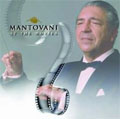
Mantovani used to be such an important part of the Decca repertoire
that there was even a 'Mantovani Month' in May. The orchestra
was an ad hoc group of top players from London orchestras and
bands, from whom he evoked such silky sounds. Unless you think
this all too sugary, it’s very enjoyable and the recording has
survived the years well.
The Best of Flanders and Swann
From 'At The Drop of A Hat', Fortune Theatre, 1957
A Transport of Delight (London Omnibus) [4:35]
Song of Reproduction [3:29]
A Gnu [6:09]
Design for Living [4:29]
Je suis le ténébreux [2:14]
Songs for Our Time - Philological Waltz / Satellite Moon / A
Happy Song [5:38]
A Song of the Weather [1:52]
The Reluctant Cannibal [4:22]
Greensleeves [6:08]
Misalliance [3:54]
Kokoraki - A Greek Song [3:11]
Madeira, M'Dear? [5:42]
Hippopotamus [4:20]
From 'More Out Of The Hat', 1957
Vanessa [4:13]
Too Many Cookers [3:11]
From 'Wallace’s Private Zoo', 1956*
The Hippopotamus Song [3:05]
The Rhinoceros Song [2:44] 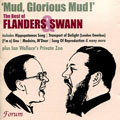
The Warthog [3:45]
The Elephant Song [2:51]
Michael Flanders and Donald Swann; Ian Wallace*
REGIS FORUM FRC6127 [76:00] - from Amazon.co.uk
(mp3)
At £3.99 for 76 minutes, this is self-recommending for
those who remember the impact that Flanders and Swann and Ian
Wallace made in the 1950s and long after.
In Brief
 Puer
natus est: Tudor Music for Advent and Christmas
Puer
natus est: Tudor Music for Advent and Christmas
Stile Antico - rec. January 2010
HARMONIA MUNDI HMU807517 [78:09] - from eMusic (mp3)
Though I have several excellent recordings of Thomas Tallis’s
Mass Puer natus est, written during the brief reign of
Queen Mary, I couldn’t resist this on the basis of earlier Stile
Antico recordings and John Quinn’s enthusiastic review - click
here
for full details. Though only one track of the eMusic download
comes at the full 320k bit-rate, the transfer does justice to
the recording. No texts, of course, but most of them, especially
the sections of the Mass, are fairly easy to come by. Those
other recordings of the Tallis Mass come from the Tallis Scholars
(Gimell CDGIM034 or better value on Christmas with the Tallis
Scholars, 2 CDs for the price of one, CDGIM202), Chapelle du
Roy (Signum SIGCD003) and The Sixteen (Coro COR16037).
Antonio VIVALDI (1678-1741)
Concerto 'Conca' for strings and continuo in B flat, RV163 [3:50]
Concerto IX from 'La cetra', Op. 9, two violins, strings and
continuo in B flat, RV530 [9:29]
Concerto for bassoon, strings and continuo in a minor, RV500
[9:52]
Concerto for sopranino recorder, strings, bassoon and continuo
in a minor, RV445 [10:29]
Concerto VI from 'La cetra' for two violins, strings and continuo
in B flat, RV526 [8:28]
Sonata for recorder, bassoon and continuo in a minor, RV86 [8:42]
Concerto fragment for bassoon, strings and continuo in d minor,
RV482 [2:46]
Concerto fragment for sopranino recorder, strings and continuo
in G, RV312 [3:39]
Concerto X 'L'Amoroso' from 'La cetra' for violin, strings and
continuo in E, RV271 [11:44]
Adrian Chandler (violin); Pamela Thorby (recorder); Peter Whelan
(bassoon)
La Serenissima/Adrian Chandler rec. Hospital of St Cross, Winchester
February 2010. DDD.
AVIE AV2201 [72:02] - from eMusic
(mp3) or Classicsonline.com
(mp3)
John-Pierre Joyce thought that La Serenissima’s scholarship
and talents had been wasted on a rather uninspiring programme
- see review.
The title is rather facetious but you may well feel, as I do,
that the first half of J-PJ’s summation, re the scholarship
and talent, is more apposite than the second. Subscribers can
try first on the Naxos Music Library if in doubt, from which
source, and from classicsonline to purchasers, the Avie booklet
is also available.
Those looking for a Vivaldi bargain should note that Virgin
have just reissued Fabio Biondi’s performances of Op.3 and Op.8,
including, of course, The Four Seasons, with Europa Galante
in a 4-CD box (6484082, around £14.50) - or download Op.3
for an unbelievably inexpensive £2.99 from Amazon.co.uk.
Georg GEBEL (Junior) (1709-1753)
 Christmas
Oratorio (Musikalische Andacht am Heiligen Christ-Abende,
1748) [36:23]
Christmas
Oratorio (Musikalische Andacht am Heiligen Christ-Abende,
1748) [36:23]
New Year’s Oratorio (Musikalische Andacht am Neuen Jahres-Abende,
1748) [32:53]
Monika Mauch, soprano; Kai Wessel, alto; Nico van der Meel,
tenor; Peter Kooy, bass
Cantus Thuringia; Capella Thuringia/Bernhard Klapproth
rec. June, 2003, Evangelische Kirche St Bonifatius, Ditfurth,
Germany. DDD
CPO 999 993-2 [69:26] - from Passionato.com
(mp3 and lossless) or Classicsonline.com
(mp3)
Johan van Veen noted some minor disappointments in an otherwise
recommendable recording - see review.
With good mp3 and lossless transfers, this makes a very worthwhile
alternative to the usual Christmas fare. Passionato have it
in lossless sound, but Classicsonline charge less - just £4.99.
Dialogues of Sorrow: Passions on the Death of Prince Henry
(1612)
Gallicantus/Gabriel Crouch
SIGNUM SIGCD210 [70:46] - available from eMusic
(mp3)
Don’t be put off at the prospect of 71 minutes of laments from
a group of early 17th-century composers whose styles, though
not markedly varied to the modern ear, contain more variety
than you may think. Go for the earlier Gallicantus recording
of the music of Tudor composer Robert White first (SIGCD134
- see review
by Robert Hugill and my November 2010 Download Roundup). Those
who already own that should head straight for the new recording.
Please see my detailed review of the parent CD here.
I can’t vouch for the quality of the download, merely for that
of the CD.
Some Recent Regis CDs
Three recent reissues on the budget Regis label have come my
way. I don’t recommend trying to find downloads of them - the
discs are inexpensive enough - but I’m including them here in
order to get my thoughts on them online well before Christmas:
none of them are Christmas-y, but they may make ideal presents.
Masters of the English Renaissance
John TAVERNER (c.1495-1545)
Kyrie le Roy [5:21]; Alleluya V. Veni electa mea [3:37];
Ave Dei Patris filia [13:52]
John MASON (d.1548) O
rex gloriose [11:32]
Robert PARSONS (c.1535-1572)
Ave Maria [3:33]
John SHEPPARD (c.1515-1558)
The Lord’s Prayer [3:38]
Thomas WEELKES (c.1575-1623)
Alleluia, I heard a Voice [2:57]; Give Ear, O Lord [5:32]; Ninth
Service - Magnificat [8:36]; Nunc Dimittis [6:50]
Richard DERING (c.1580-1630)
Factum est silentium [2:44]
Orlando GIBBONS (1583-1625)
Hosanna to the Son of David [2:27]
The Choir of Christ Church Cathedral, Oxford/Stephen Darlington
REGIS RRC1320 [70:45]
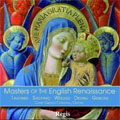 These
recordings are taken from various CDs which the Christ Church
Cathedral Choir and Stephen Darlington have made for Nimbus.
I’ve reviewed several of them for MusicWeb International and
been generally impressed by their high quality: even when they
have not been my first choice, they represent valuable alternatives
to recordings by professional, mostly mixed-voice groups. That’s
especially the case with the music of John Taverner, the first
informator choristorum or master of the choristers at
Wolsey’s new foundation, Cardinal College, later to be renamed
Christ Church. Excellent as the recordings of his music by The
Sixteen and the Tallis Scholars are, it’s especially valuable
to hear his music sung by a choir of the same proportions and
at the same establishment as the one which he directed almost
half a millennium ago.
These
recordings are taken from various CDs which the Christ Church
Cathedral Choir and Stephen Darlington have made for Nimbus.
I’ve reviewed several of them for MusicWeb International and
been generally impressed by their high quality: even when they
have not been my first choice, they represent valuable alternatives
to recordings by professional, mostly mixed-voice groups. That’s
especially the case with the music of John Taverner, the first
informator choristorum or master of the choristers at
Wolsey’s new foundation, Cardinal College, later to be renamed
Christ Church. Excellent as the recordings of his music by The
Sixteen and the Tallis Scholars are, it’s especially valuable
to hear his music sung by a choir of the same proportions and
at the same establishment as the one which he directed almost
half a millennium ago.
Don’t be surprised if the three works by Taverner on this CD
lead you to explore further, in which case, if you wish to avoid
duplicating these performances, all taken from Nimbus NI5360:
Music for Our Lady and Divine Office - see review
- you may turn with confidence to The Sixteen’s set of Tudor
Church music which was one of my recordings of the Year in 2009,
The Golden Age of English Polyphony (Hyperion CDS44401/10: Bargain
of the Month) includes all but one of Taverner’s Masses and
several shorter works - see review
and review.)
A less daunting but equally attractive budget-price set from
the Tallis Scholars also contains an excellent performance of
Taverner’s Western Wind Mass, The Tallis Scholars sing Tudor
Church Music, CDGIM209, 2 discs for the price of one - see review.
Don’t forget the three volumes of highlights from the Tallis
Scholars’ 30 years before the recording mast, reviewed last
month and above.
I must also mention an excellent recent recording of Taverner’s
music, including the Missa Corona Spinea by another Anglican
cathedral choir, that of St Mary’s, Edinburgh, on Delphian DCD34023
(Recording of the Month - see review
and review.)
That recording features the Kyrie Leroy in a slightly
brisker performance than that offered by Christ Church, or,
indeed, by The Sixteen and the Tallis Scholars.
The Glory of New College
CD1
John TAVERNER (1490-1545)
Mater Christi [5:44]
Christopher TYE (1505-1572)
Christ Rising again from the Dead [3:45]
William BYRD (1543-1623)
Gloria from the Four-Part Mass [3:28]
Thomas TALLIS (1505-1585)
Dum Transisset [6:27]
Orlando GIBBONS (1583-1625)
O Clap Your Hands Together [5:46]
Thomas TOMKINS (1572-1656)
Jubilate [6:24]
Giovanni PALESTRINA (1525-1594)
Stabat Mater [9:22]
Orlande de LASSUS (1532-1594)
Veni Creator [8:13]
Philippe de MONTE (1521-1603)
Super Flumina Babylonis [6:01]
Eustache Du CAURROY (1549-1609)
Salve Regina [4:48]
CD2
Henry PURCELL (1659-1695) Rejoice
in the Lord Alway [8:57]
William CROFT (1678-1727) God
is Gone Up [4:37]
Maurice GREENE (1696-1755)
Lord Let Me Know Mine End [6:30]
William BOYCE (1711-1779) By
the Waters of Babylon [8:20]
Jonathan BATTISHILL (1738-1801)
Call to Remembrance [6:42]
William CROTCH (1775-1847)
How Dear Are Thy Counsels [2:30]
Samuel Sebastian WESLEY (1810-1876)
Blessed be the God and Father [7:53]
Charles Villiers STANFORD (1852-1924)
The Lord is my Shepherd [8:24]
Gabriel FAURÉ (1845-1924)
Sanctus and Pie Jesu from the Requiem
[6:13]
The Choir of New College, Oxford/Edward Higginbottom
From various recordings in the CRD catalogue.
REGIS RRC2091 [63:05 + 60:13]
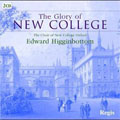 This
slightly longer collection from New College Choir covers more
ground chronologically than the Christ Church collection and
is equally self-recommending. Now that the choir has just launched
its own label, it’s good to be reminded of their earlier recordings
for CRD. Once again, the danger of buying this sampler is that
you will want some of the parent recordings, too.
This
slightly longer collection from New College Choir covers more
ground chronologically than the Christ Church collection and
is equally self-recommending. Now that the choir has just launched
its own label, it’s good to be reminded of their earlier recordings
for CRD. Once again, the danger of buying this sampler is that
you will want some of the parent recordings, too.
That’s also the case with the excellent 2-CD album of excerpts
from the complete Signum set of the music of Thomas Tallis which
Regis issued on their Portrait label in 2007 and which is now
due for reissue again (RRC2090, Chapelle du Roy/Dixon).
I understand that the discrepancies of numbering between the
booklet and the actual tracks on CD have been put right. (See
my original review:
Bargain of the Month).
Marcel DUPRÉ (1886-1931)
Organ Works
Prelude and Fugue in A-flat, Op. 36/2 [9:13]
Evocation, Poème symphonique, Op. 37 [22 :57]
Six antiennes pour le temps de Noel, Op. 48 : Ecce
Dominus veniet [2:40]; Omnipotens sermo tuus [3:05];
Tecum principium [2:26]; Germinavit radix Jesse [1:40];
Stella ista [2:27]; Lumen ad revelationem [2:14]
Psalm XVIII, Poème symphonique, Op. 47 [20:27]
Choral and Fugue in f-sharp minor, Op. 57 [6:31]
Jeremy Filsell (Harrison organ of Ely Cathedral)
rec. Ely Cathedral, c.1991? DDD.
REGIS RRC1321 [73:51]
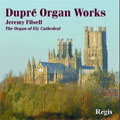 Like
the recent Regis CD of Richard Dering’s Motets (RRC1355
- see my review),
this Dupré recording was originally released on the Gamut
label, in this case on GAMCD530, in 1992. Like the Dering CD,
it can be thoroughly recommended, with a small reservation about
the parsimonious booklet of notes - less of a problem this time,
since there are no texts to bemoan the lack of. (I understand
that the Dering CD will be re-released in 2011, this time with
the texts and translations). Jeremy Filsell subsequently recorded
the complete Dupré organ works for Guild, to considerable
acclaim, but the reissue of this single CD is no less welcome.
Like
the recent Regis CD of Richard Dering’s Motets (RRC1355
- see my review),
this Dupré recording was originally released on the Gamut
label, in this case on GAMCD530, in 1992. Like the Dering CD,
it can be thoroughly recommended, with a small reservation about
the parsimonious booklet of notes - less of a problem this time,
since there are no texts to bemoan the lack of. (I understand
that the Dering CD will be re-released in 2011, this time with
the texts and translations). Jeremy Filsell subsequently recorded
the complete Dupré organ works for Guild, to considerable
acclaim, but the reissue of this single CD is no less welcome.
 Christmas
Carols from St John’s
Christmas
Carols from St John’s
Piae Cantiones (arr. G. Shaw) Unto Us a Boy
Is Born! [1:50]
Anonymous (French, arr. C. Wood) Ding Dong! Merrily
on High [2:02]
Peter WARLOCK Balulalow
[2:16]
Traditional (arr. H. Walford DAVIES) The Holly and the
Ivy [2:40]
Gustav HOLST (arr. P. KENYON)
In the Bleak Mid-Winter [4:23]
Traditional (arr. D. WILLCOCKS)
Sussex Carol [1:46]
Patrick HADLEY I Sing of
a Maiden [2:44]
John RUTTER Shepherd’s Pipe
Carol [3:28]
Franz Xaver GRUBER (arr. D.
CASHMORE) Silent Night [3:42]
Felix MENDELSSOHN (arr. D. WILLCOCKS)
Hark! The Herald Angels Sing [3:12]
Traditional (arr. R. VAUGHAN WILLIAMS) O Little Town
of Bethlehem [4:07]
God Rest You Merry, Gentlemen [3:09]
Elizabeth POSTON Jesus Christ
the Apple Tree [3:28]
Piae Cantiones (arr. KENYON/JACQUES) Good King
Wenceslas [2:57]
Anonymous (c. 1420, ed. J. STEVENS) There Is No Rose
[4:38]
Raymond WILLIAMS Two Welsh
Carols: Graewdwr nef a daear lawr [2:16]; Pan fo'r
stormydd garwa'n curo [1:49]
William J. KIRKPATRICK (arr.
D. WILLCOCKS) Away in a Manger [2:33]
Traditional O Come, All Ye Faithful [4:06]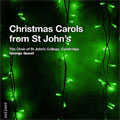
Choir of St John’s College, Cambridge/George Guest - rec.? DDD.
CHANDOS COLLECT CHAN6670 [57:06] - from theclassicalshop.net
(mp3)
Chandos’s present in mp3 form to subscribers to their classicalshop
newsletter; £4.80 (mp3) or £4.99 (lossless) to everyone
else. Well worth buying, but another reminder that it’s worth
taking a few minutes to sign up for the newsletter.












